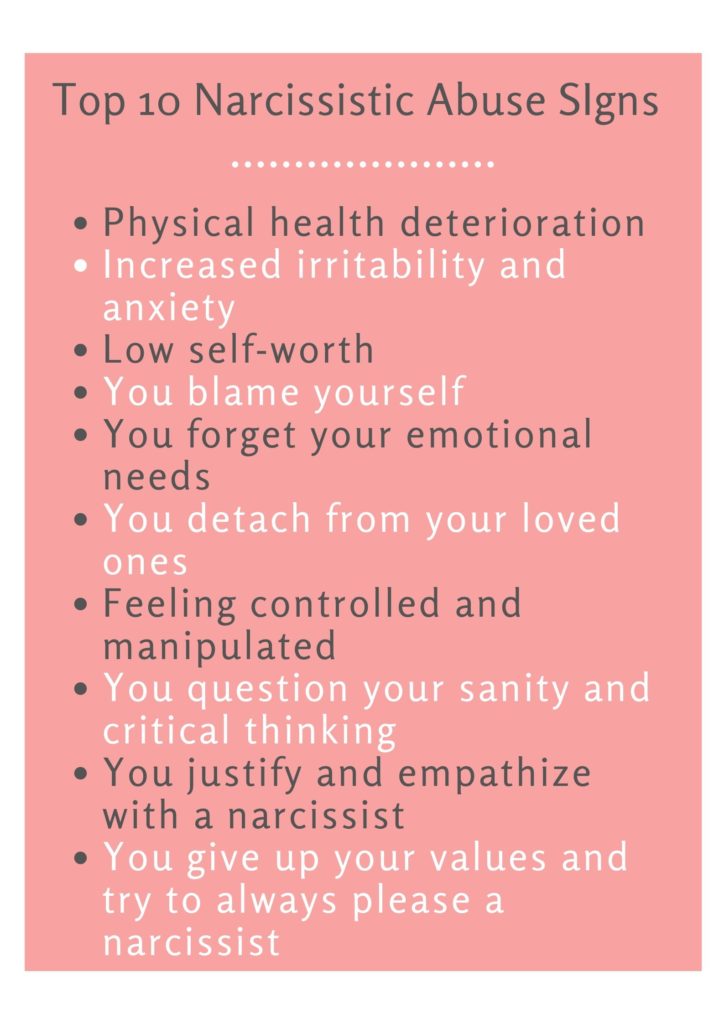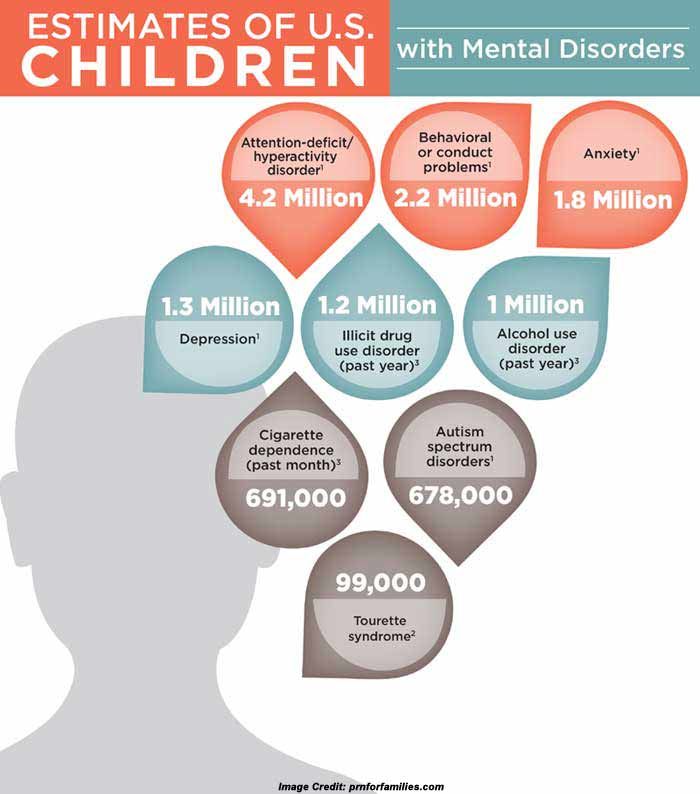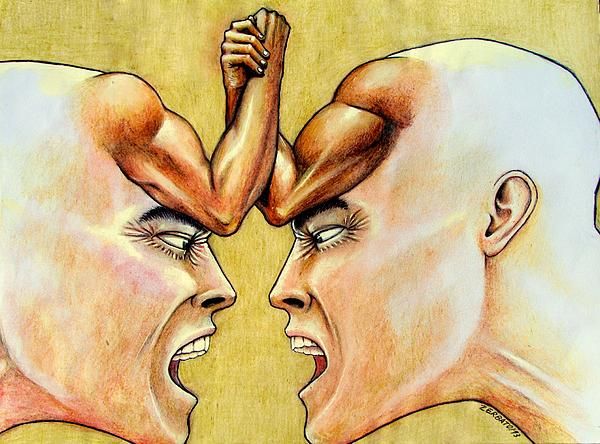Victim of narcissistic abuse syndrome
Narcissistic Victim Syndrome: 10 Warning Signs to Know
Last Updated on April 11, 2022 by Ray
No one should have to live in an abusive relationship. Unfortunately, narcissistic people can be difficult to identify, and living with a narcissistic individual can lead to a condition known as narcissistic victim syndrome, in which the victim’s mental health and self-confidence are adversely affected.
We’ll cover what narcissistic victim syndrome is, the warning signs, and how to get help.
Table of Contents
What Is Narcissistic Abuse?
Narcissistic abuse is a type of emotional abuse that comes from someone suffering from narcissism. They have a tendency (whether conscious or not) to use manipulative actions to alter or control their partner’s behavior.
While narcissistic abuse tends to fall under emotional manipulation and thought control, there are various ways that narcissists go about doing so. Manipulative techniques like gaslighting are commonly used by narcissists to disorient and confuse their partners so that they are more susceptible to their demands.
What Is Narcissistic Victim Syndrome?
Narcissistic victim syndrome occurs when someone has lived with or spent a significant amount of time with a person classified as a narcissist. People struggling with this syndrome often have doubts about their sanity and self-worth and have concerns about their failures, flaws, and perceived shortcomings. In many cases, these ideas get planted in their minds by a narcissistic partner, family member, or friend.
Those struggling with narcissistic victim syndrome typically have a challenging time identifying with reality. They may start to question what’s really happening since their minds get confused and distorted from the content manipulation and emotional abuse.
There are many symptoms that someone struggling with narcissistic victim syndrome might have, and some of them mimic symptoms of PTSD. Let’s look at some of the most common signs of narcissistic abuse.
While many of the signs (we’ll cover these in a moment) may be easy to spot for someone who has been a victim of a narcissist, it can be extremely difficult for others to notice. People experiencing narcissistic victim syndrome often feel insecure, delusional, or ashamed and are unable to understand that they aren’t the problem.
People experiencing narcissistic victim syndrome often feel insecure, delusional, or ashamed and are unable to understand that they aren’t the problem.
Narcissistic abuse is also often seen in codependent relationships where the narcissist creates a relationship in which their partner is dependent on them. What’s not talked about frequently is that the narcissist is typically as dependent on the other person; they require a partner as an outlet for their abuse.
Here are ten signs of narcissistic victim syndrome to watch out for:
1. False Perfection
While narcissistic abuse can look different depending on the relationship, it tends to follow a similar pattern. In romantic relationships, narcissistic abuse usually starts slowly, after you fell hard and fast for someone.
During the relationship’s early stages, victims of this abuse typically fall for the abuser because they seem kind, generous, and loving. They probably made you feel special and bombarded you with affectionate displays, compliments, and gifts. It’s usually overwhelming and intense, and the narcissistic abuse victim doesn’t usually consider that things might be too great. With time, manipulative tactics begin to replace the gifts, compliments, and signs of love.
It’s usually overwhelming and intense, and the narcissistic abuse victim doesn’t usually consider that things might be too great. With time, manipulative tactics begin to replace the gifts, compliments, and signs of love.
In the case of narcissistic parents or family members, they usually offer adoration, love, and support until you do something that displeases them and you lose their favor. They often use the same manipulative tactics that an abuser in a romantic relationship does.
2. Feelings of Isolation
Many times, narcissistic abuse victims don’t get the support they need from other loved ones. They might not listen to you, which can leave you feeling isolated and even more vulnerable to manipulation tactics. At this point, the abuser will often pull you back in with apologies and kindness, or they might pretend that the abuse never even happened. This tactic works the best when the victim lacks a support system because they are more likely to doubt their perceptions of the abuse when they can’t talk to someone about it.
Sometimes, the victim’s loved ones will tell them they’ve made a mistake and encourage them to give their abusive partner another chance. Oftentimes, they will end up doing so simply for a chance to regain their connection with their family and friends, which can lead to worse issues down the road.
3. The Freeze Response
Everyone responds to abuse in different ways, but the freeze response is a common sign in people with narcissistic victim syndrome. It happens when they feel helpless and involves dissociation, where the victim emotionally distances themselves to decrease the pain and distress they are experiencing.
While the freeze response can be beneficial in some situations, it does more harm when you would otherwise have the ability to escape from the danger. Narcissistic abuse victims have the tendency to believe that there’s no way out of the relationship and might remain in it rather than seeking support to leave safely (we’ll discuss getting help leaving an abusive relationship further down).
4. Doubting the Abuse
Narcissistic abuse is subtle. Even when it happens in public, it can be a challenge to recognize what you hear or see as abuse. Many victims of narcissistic abuse may not even realize what’s happening; they just know they feel upset, confused, or guilty for their “mistakes.”
The abuser may make ill-intentioned “jokes” in a way that encourages everyone else around to join in the laughter to make it seem harmless and well-intentioned. Many friends and loved ones of narcissistic abuse victims don’t see the signs as actual abuse, and you might hear them say things like “you misunderstood them” or “they wouldn’t intentionally hurt you.”
This doubt can be just as harmful as the abuse itself. Not only does it harm your relationship with those loved ones, but it can lead to you questioning yourself about if the abuse did take place after all.
5. Smear Campaigning
Often, people with narcissistic traits feel the need to maintain an image of perfection to keep earning other’s admiration.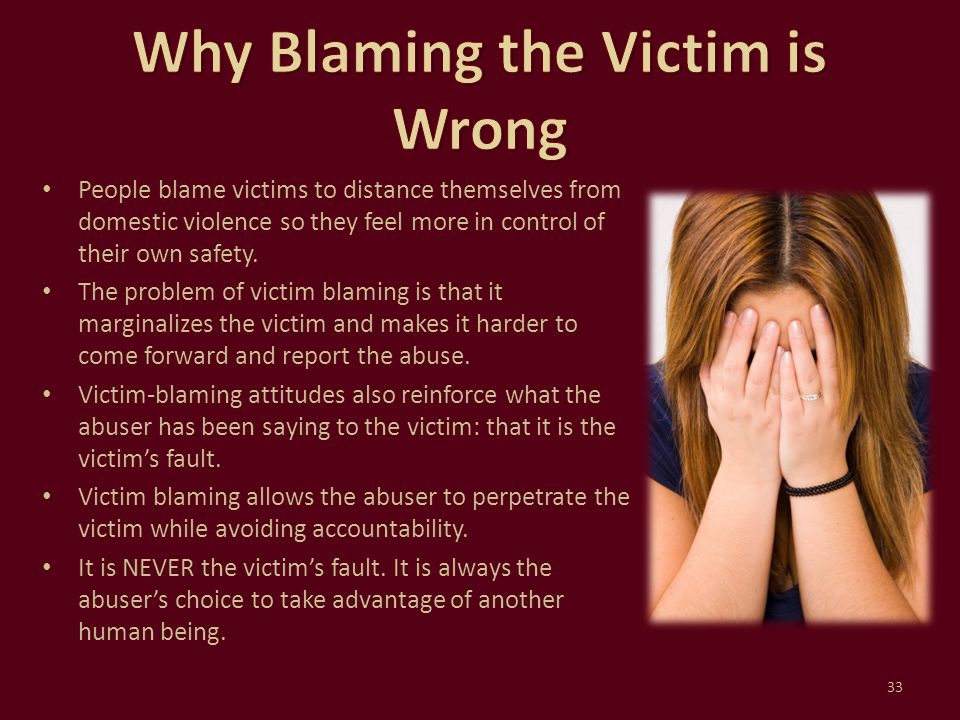 To achieve this, they might try to make you look bad. When you question their behaviors or point out problems, they might lash out and insult or threaten you, or they might get others involved in criticizing you.
To achieve this, they might try to make you look bad. When you question their behaviors or point out problems, they might lash out and insult or threaten you, or they might get others involved in criticizing you.
They might tell your loved ones stories and twist the facts to make your behavior look unstable or harmful in an attempt to discredit you. Then, if you react angrily, they’ll use your angry response to back up their lies.
Narcissistic abusers often have the ability to charm others. Remember that persona we mentioned in number one? That’s what everyone else still sees. They often get support from your friends and family who haven’t seen through their facade by insisting that your best interests are their concern. That’s why, when trying to explain the abuse, they might side with your abuser.
6. Decision-Making Troubles
The criticism narcissistic abuse victims constantly face can leave them with very little confidence and self-esteem. The abusers often make implications that your decisions are bad and you can’t do anything right.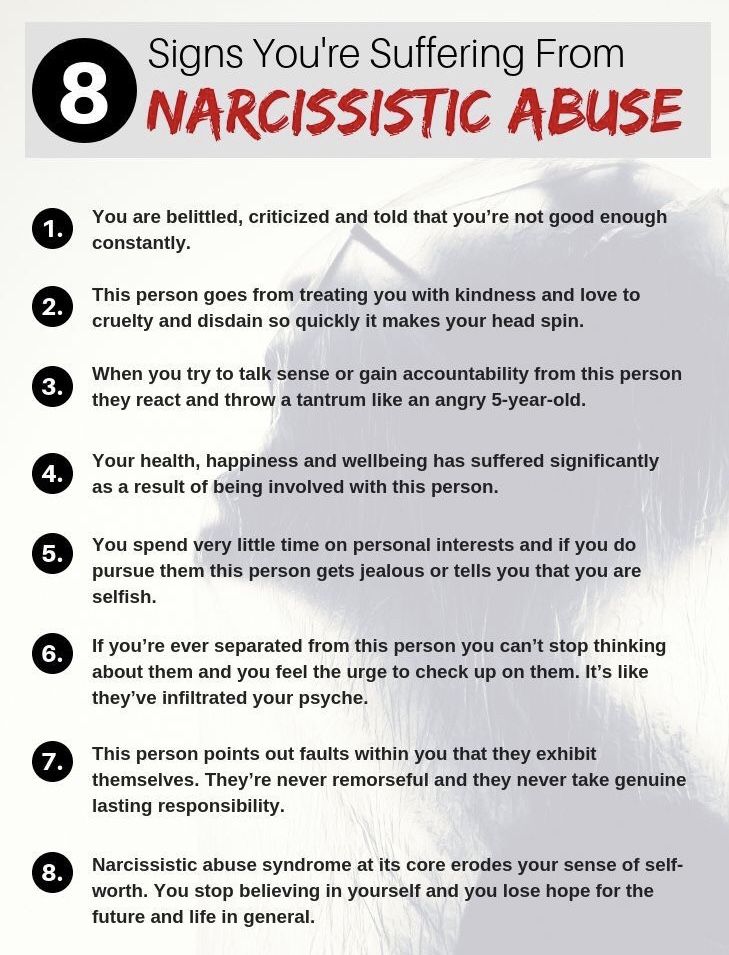 Abusive partners might put you down outright or make insults with a false, affectionate tone mixed with sarcasm.
Abusive partners might put you down outright or make insults with a false, affectionate tone mixed with sarcasm.
Over time, you might absorb the insults and attach them to your perception of yourself, which can lead to constant second-guessing. Gaslighting tactics can also bring doubt to your decision-making abilities. When someone manipulates you to believe you’re imagining things, it’s easy to continue doubting your perception of various events, and this uncertainty can affect your decision-making abilities well into the future.
7. Self-Identity Adjustments
When facing abuse, you might not even recognize yourself. Many victims end up adjusting their self-identity to fit in with their abusive partner. Abusers use this to isolate their victims from friends and family, telling them things like, “you’d rather see them instead of me; you don’t love me.” Then, the victim will eventually stop visiting other people to prove their love to the abuser.
From there, it spirals into skipping after-work drinks with a co-worker, giving up your hobbies, canceling regular family visits, etc.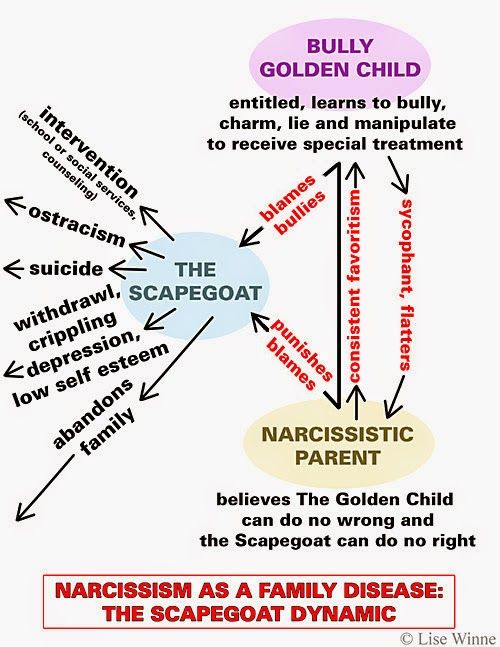 The victim ends up spending all of their time doing what the abuser wants to and loses their self-identity in the process. These changes can lead to losing your sense of self, leaving you feeling empty and lost. People with narcissistic abuse syndrome typically eventually lose their sense of purpose and have a difficult time enjoying anything.
The victim ends up spending all of their time doing what the abuser wants to and loses their self-identity in the process. These changes can lead to losing your sense of self, leaving you feeling empty and lost. People with narcissistic abuse syndrome typically eventually lose their sense of purpose and have a difficult time enjoying anything.
8. Setting Boundaries
Narcissistic abusers often have little or no respect for your personal boundaries. When trying to set and enforce limits, they’ll challenge them, ignore them, or ignore you until you act how they want you to. Eventually, victims usually give up on their boundaries entirely. Once ending the relationship or getting distance from a narcissistic family member or friend, you’ll promise yourself that you won’t see them or answer their messages.
But, if the abuser thinks they can wear you down eventually, they might not give up so easily. Instead, they’ll continue to call and text in hopes of you seeing aside those boundaries again. People with narcissistic victim syndrome often have trouble setting up healthy boundaries in any of their relationships.
People with narcissistic victim syndrome often have trouble setting up healthy boundaries in any of their relationships.
9. Anxiety, Depression, and Other Mental Health Symptoms
Anxiety and depression are common developments that result from narcissistic abuse. The stress the victims face can trigger feelings of fear, worry, and nervousness, especially when they don’t know what to expect from the abuser’s behavior. They might feel worthless or hopeless and lose interest in activities they used to enjoy. They also might struggle to see any hopeful outcomes for the future.
It’s also common for the victim’s friends and family to have confusion about the abrupt changes, especially when they aren’t aware of the narcissistic abuse that’s happening.
One of the biggest mental health symptoms of narcissistic victim syndrome is feeling like you’re always doing something wrong. Narcissists have difficulty taking responsibility for harmful behavior or negative actions.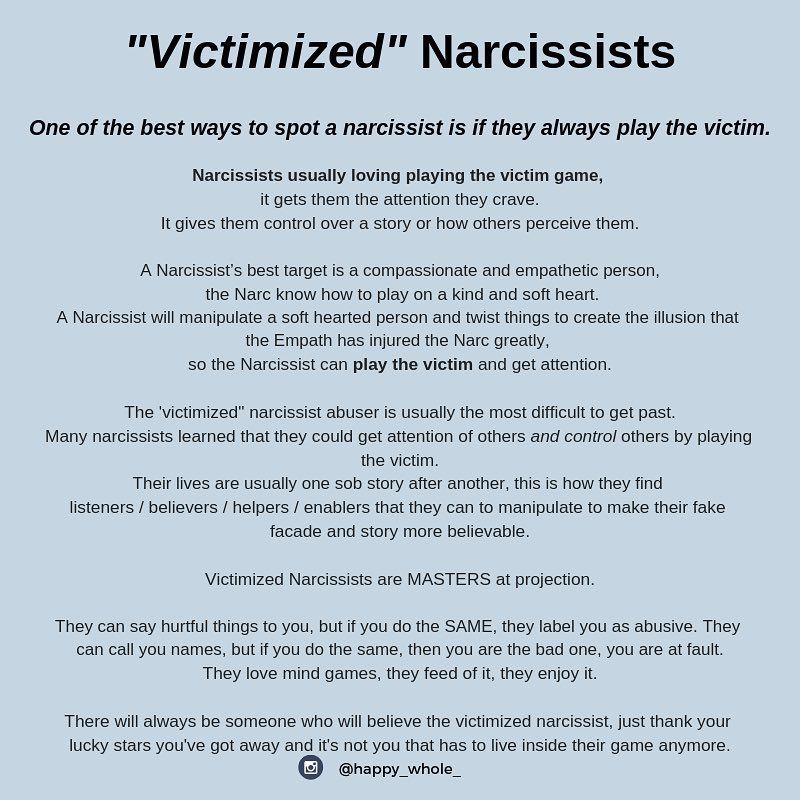 They typically find a way to blame the abuse victim. Oftentimes, this ends up with them being aggressive and angry, which can leave the victim feeling dependent and helpless.
They typically find a way to blame the abuse victim. Oftentimes, this ends up with them being aggressive and angry, which can leave the victim feeling dependent and helpless.
Even once they’re out of the abusive relationship, the belief that they can’t do anything right might remain for years afterward. It can be a challenge for victims of narcissistic abuse to accept that they aren’t the cause of every problem.
10. Restlessness and Other Physical Symptoms
Narcissistic abusers are unpredictable. Their victims don’t know what’s going to happen next; will you get criticized or surprised with a gift? Not knowing what will happen or what someone will say can end up with the victim developing tension from the need to constantly prepare for conflict. It can leave them constantly on edge and unable to let their guard down.
Narcissistic abuse can also trigger feelings that lead to physical symptoms, including:
- Appetite changes
- Stomach pain or gastrointestinal issues
- Insomnia
- Nausea and upset stomach
- Muscle aches and pains
- Fatigue
Why Do Narcissists Always Play the Victim?
To put it simply, narcissists are extremely arrogant.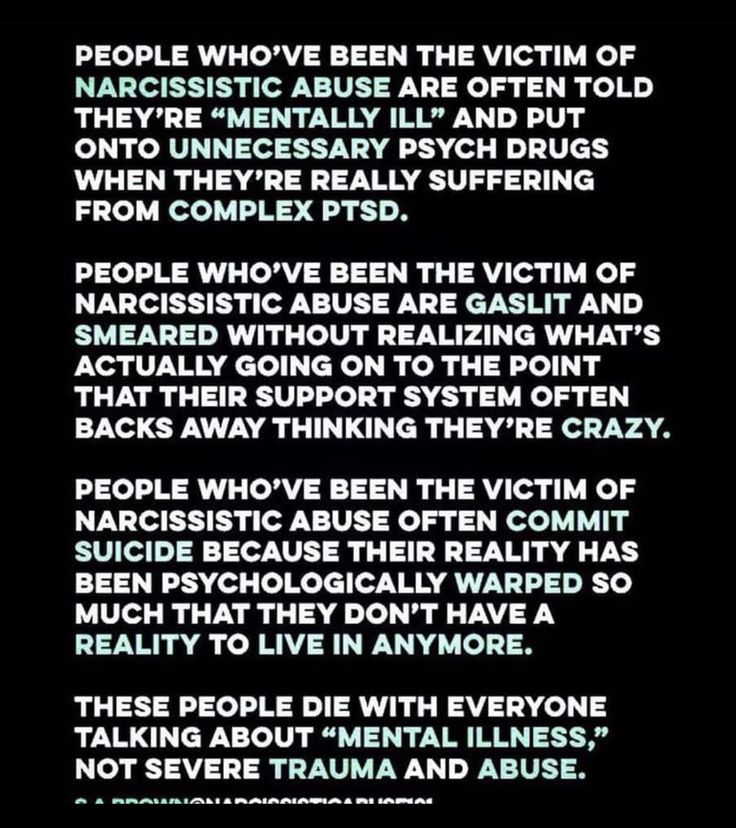 They usually have a grandiose sense of self and cannot look beyond themselves. However, this self-esteem they seem to have in droves isn’t authentic. Because of this, their self-pity and ability to “play the victim” will often substitute their authentic self-worth.
They usually have a grandiose sense of self and cannot look beyond themselves. However, this self-esteem they seem to have in droves isn’t authentic. Because of this, their self-pity and ability to “play the victim” will often substitute their authentic self-worth.
Essentially, a narcissist plays the role of a victim because it makes them the misunderstood and mistreated hero in their own story, which is all about them. It focuses on the narrative that their needs are the most important because they have not been met in the past or because they were wronged in some way in the past.
In some way, a narcissist believes the role they play. That is because it plays into the belief that they deserve all the respect and attention in your relationship.
The narcissist is so good at their role that you may even find that you are taking their side. You begin to feel guilty and like your actions have wronged them.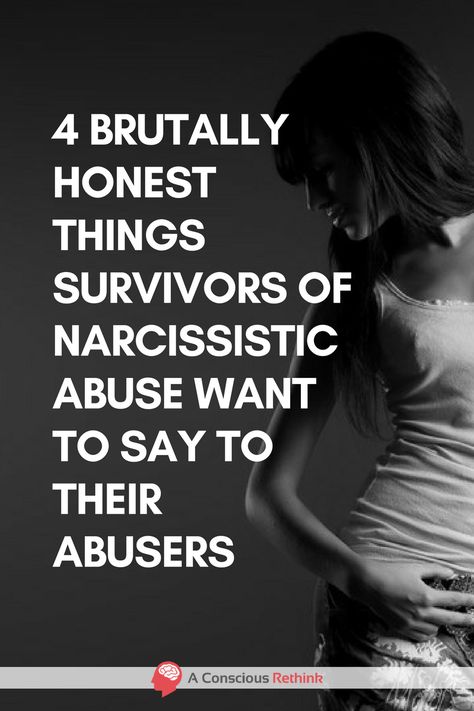 Unfortunately, this only fuels their role as the victim further. You may even provide more positive affirmations or agree to things you wouldn’t typically do. This is all part of the abuse cycle that narcissists are so good at creating to control situations and maintain their false sense of self-worth.
Unfortunately, this only fuels their role as the victim further. You may even provide more positive affirmations or agree to things you wouldn’t typically do. This is all part of the abuse cycle that narcissists are so good at creating to control situations and maintain their false sense of self-worth.
When it comes to how a narcissist thinks, it’s all based on extremes. Because of this, there are no situations when they won’t be the victim until you find a way to break free from their vicious cycle.
How to Get Help
Any kind of abuse, narcissistic or otherwise, can take a significant toll on the victim’s physical and emotional health. Especially if your loved ones doubt the abuse, you may feel unsupported and unheard, making it difficult to trust anyone again. Whether you’re currently experiencing narcissistic victim syndrome or you’re trying to make sense of a past relationship, a life coach can help you start to heal.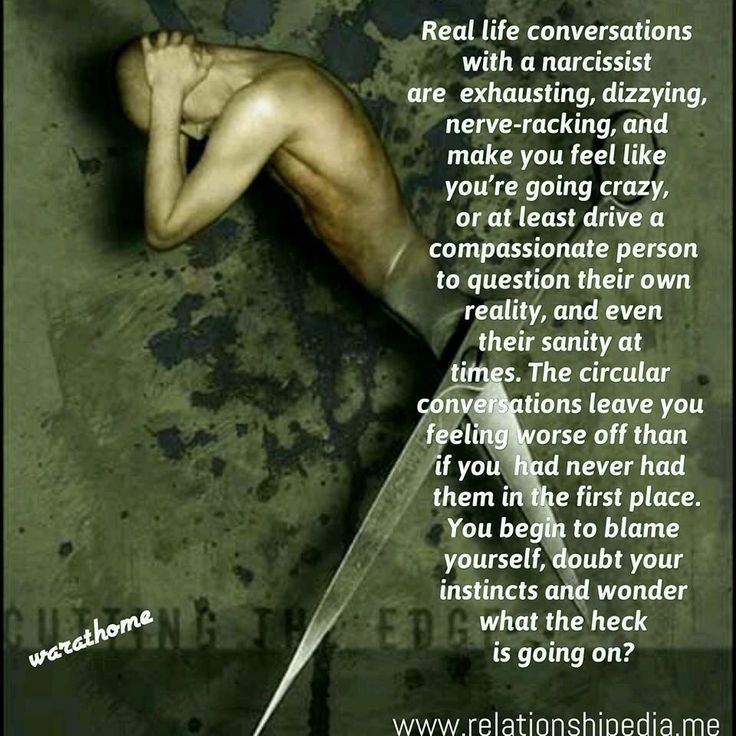
Working with a life coach offer numerous benefits for victims of abuse, including:
- Learn coping strategies to manage your mental health symptoms
- Practice setting boundaries in relationships
- Explore how to rebuild your sense of self
It’s important to seek help if you or someone you care about is struggling with narcissistic victim syndrome. Not only should you make an effort to get the narcissist out of the picture, but you should also seek treatment for your symptoms.
Are you looking for a life coach to help you get through the tough times? Get in touch with Ray of Solace and get the support that you need.
Related: Life Coaches Benefits and FAQs
12 Signs You Might Have Narcissistic Victim Syndrome
Narcissistic personality disorder (NPD) is a complex mental health condition that typically involves a grandiose or inflated sense of self and an extreme need for admiration and attention, among other symptoms.
People with NPD or narcissistic tendencies sometimes show a pattern of manipulative, controlling behavior that involves both verbal abuse and emotional manipulation.
Common types of narcissistic manipulation include:
- Triangulation. Someone using this tactic will try to pull a third person into your conflict, typically to reinforce their own opinion or position.
- Gaslighting. Someone trying to gaslight you tries to get you to doubt your own perspective and reality, often by twisting facts or insisting things you remember didn’t actually happen.
- Hoovering. This tactic involves attempts to reconnect, or pull you back into a toxic or abusive relationship.
- Silent treatment. This behavior becomes manipulative when someone purposely ignores you to control you or make you feel isolated.
- Scapegoating. Parents who use narcissistic manipulation may place all the blame on one child they designate as a scapegoat.
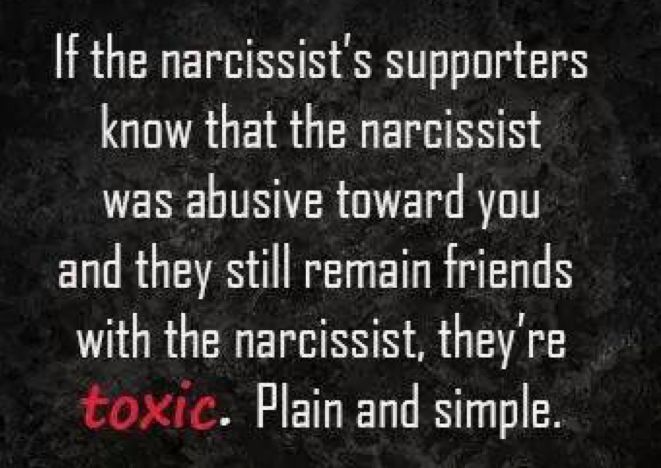
- Passive aggression. Indirect blame-shifting, sabotage, and sarcasm can all point to covert narcissistic manipulation.
These tactics can confuse you, make you question your sense of reality, and damage your self-esteem.
Narcissistic victim syndrome is a term that collectively describes the specific and often severe effects of narcissistic manipulation. While this isn’t a recognized mental health condition, many experts acknowledge narcissistic abuse can have a serious, long lasting impact on mental health.
Keep in mind that abuse and narcissism aren’t always related. A diagnosis of NPD doesn’t automatically translate to abusive behavior, and many people who engage in abuse don’t have NPD.
Regardless, a mental health diagnosis never excuses abusive behavior. People choose to abuse and manipulate others, and it’s possible to live with traits of narcissism, or any personality disorder, without becoming abusive.
With that in mind, here are 12 signs that might suggest you’ve experienced narcissistic abuse.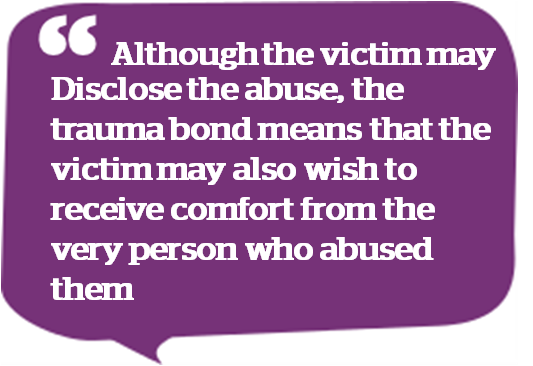
Narcissistic abuse tends to follow a clear pattern, though this pattern might look a little different depending on the type of relationship.
Research from 2019 suggests that in a romantic relationship, this abuse typically begins slowly after you’ve fallen hard and fast.
It’s no wonder you fell for them. During the love-bombing phase, they seemed loving, kind, and generous. They made you feel special and adored with gushy compliments, affectionate displays, and expensive gifts.
This early stage might have felt so intense and overwhelming you never stopped to consider whether they might be too fantastic. Then slowly, negging or other manipulative tactics began to replace the gifts and declarations of love.
Narcissistic parents might also offer love, adoration, praise, and financial support until you do something to displease them and lose their favor. Then they, too, often turn to tactics like negging, silent treatment, and gaslighting.
Narcissistic manipulation and abuse are often subtle. In public, these behaviors might be so well disguised that others hear or see the same behaviors and fail to recognize them as abuse.
In public, these behaviors might be so well disguised that others hear or see the same behaviors and fail to recognize them as abuse.
You might not even fully understand what’s happening. You only know you feel confused, upset, or even guilty for your “mistakes.”
A narcissistic parent might gently say, “Are you sure you want to eat dessert?” Or they might turn a broken dish into a joke at your expense: “You’re so clumsy. You just can’t help yourself, can you?” They laugh with everyone in the room while patting your shoulder to make the insult seem well-intentioned.
You would hope friends and loved ones believe you. But, unfortunately, this doesn’t always happen. Your loved ones might not doubt your belief you were abused, but they might question your perception of events or assure you, “You must have misunderstood them. They’d never hurt you intentionally.”
This doubt can be doubly harmful. Not only does it dismantle your faith in your loved ones, but it can also lead you to wonder whether the abuse took place after all. Maybe you did read too much into their words or just imagined that look on their face.
Maybe you did read too much into their words or just imagined that look on their face.
People with narcissistic traits often need to maintain their image of perfection in order to keep earning admiration from others. To do this, they may try making you look bad.
Once you begin pointing out problems or questioning their behavior, they might lash out by:
- openly directing their rage toward you with insults and threats
- involving others in criticizing you
By telling stories to your loved ones that twist the facts about your “harmful” or “unstable” behavior, the narcissist tries to discredit you. Even worse, when you react angrily (who wouldn’t?), they can use your response to back up their lies.
People with narcissism often have a knack for charming others. That persona they showed you in the beginning? Everyone else sees that still.
They can often win support from your loved ones (who haven’t seen through the facade) by insisting they only have your best interests at heart.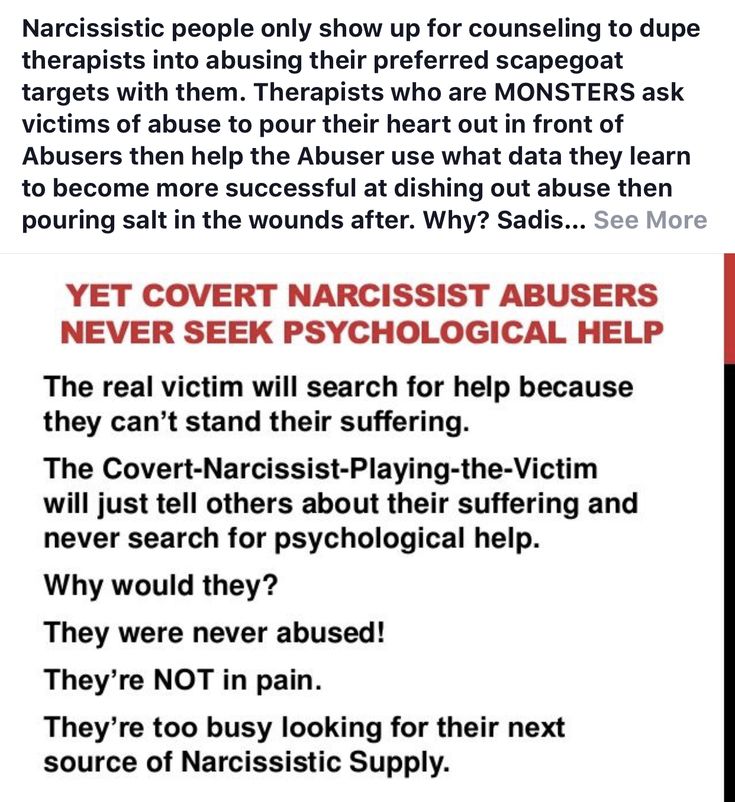 Then, when you try explaining the abuse, your loved ones might side with them.
Then, when you try explaining the abuse, your loved ones might side with them.
If your loved ones don’t understand, you’ll likely feel pretty alone — which only increases your vulnerability to further narcissistic manipulation. The person abusing you may pull you back in with kindness, even apologies, or by pretending the abuse never happened.
“Hoovering,” as it’s often called, tends to work better when you lack support. You’re more likely to doubt your perceptions of the abuse when you can’t talk with anyone about it.
If your loved ones reach out to say you’ve made a mistake and encourage you to give the abusive partner another chance, you might end up doing so simply to regain your closeness with family and friends.
People respond to abuse and other trauma in different ways.
You might attempt to confront the abusive person (fight) or escape the situation (flight). If these methods don’t work or you feel unable to use them, you might respond by freezing or fawning.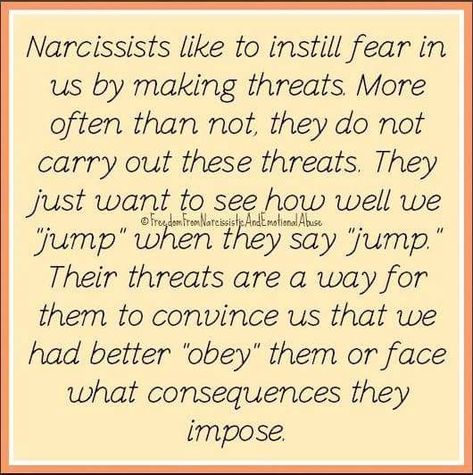
The freeze response usually happens when you feel helpless. It often involves dissociation since emotionally distancing yourself from the abuse can help decrease its intensity, effectively numbing some of the pain and distress you experience.
Freezing can have some benefits in certain situations, but it doesn’t help much when you can escape from danger. Yet if you believe there’s no way out of the relationship, you might remain in it — and perhaps even respond by fawning, or working to keep your partner happy.
A pattern of devaluation and criticism can leave you with very little self-esteem and confidence.
Narcissistic manipulation often involves frequent implications that you make bad decisions and can’t do anything right. An abusive partner may call you stupid or ignorant outright, often with a falsely affectionate tone: “Honey, you’re so dumb. How would you manage without my help?”
Over time, you might start absorbing these insults and attaching them to your self-perception, constantly second-guessing yourself as a result.
Gaslighting tactics can also make you doubt your decision-making abilities. (Here’s how to respond.)
If someone manipulates you into believing you imagined things that actually took place, you might continue doubting your perception of events. This uncertainty can affect your ability to make decisions well into the future.
A key characteristic of narcissism is difficulty taking responsibility for any negative actions or harmful behavior.
Abusive partners typically find some way to cast blame on you instead. They might accomplish this through deceit, often by:
- insisting they said something you have no recollection of
- getting so angry you end up soothing them by apologizing and agreeing you were wrong.
Say you suspect they’ve cheated on you. You explain the concerning behaviors you’ve noticed and ask if something’s going on.
A partner using narcissistic manipulation might respond with extreme anger. They may respond with accusations of their own and redirect blame, saying things that are intended to hurt and belittle you.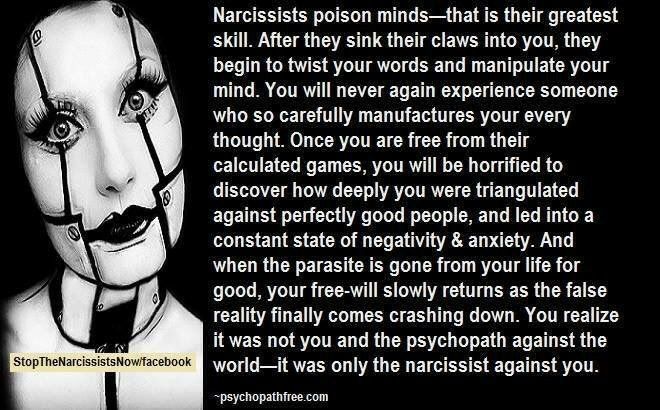
These barrages of rage can leave you feeling helpless and dependent, grateful they’re willing to remain with someone who makes so many mistakes.
Even after leaving the relationship, you might carry forward the belief you can’t do anything right. When things go wrong in other areas of life, you might start to blame yourself for causing those problems.
Abuse can trigger anxious and nervous feelings that sometimes lead to physical symptoms.
You might notice:
- appetite changes
- upset stomach or nausea
- stomach pain and other gastrointestinal distress
- muscle aches and pains
- insomnia
- fatigue
Using alcohol and other substances can sometimes seem like a helpful way to manage these symptoms, especially insomnia. As a result, you might end up consuming more than you’d like in an effort to manage unwanted feelings or physical distress.
Narcissistic abuse can sometimes be unpredictable. You may not know whether they’re going to criticize you or surprise you with a gift.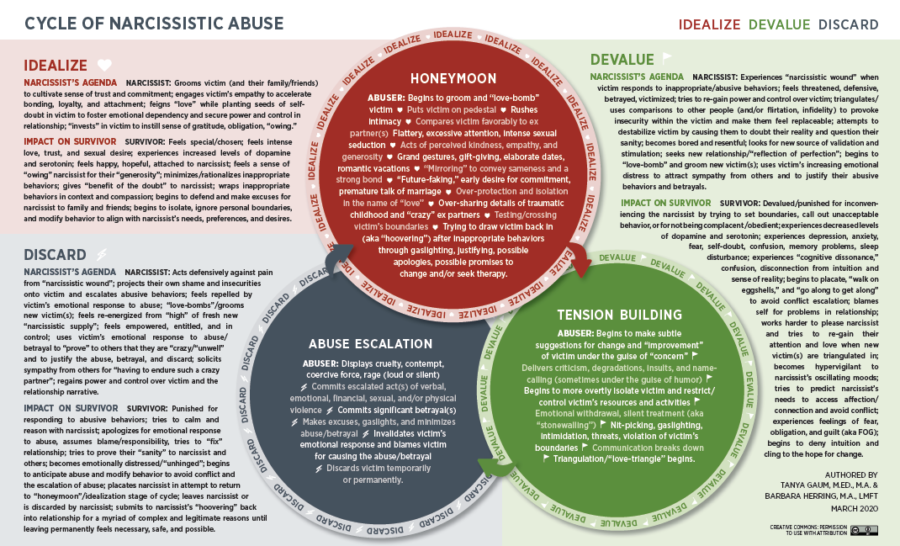
If you don’t know what someone will do or say at any given moment, you might develop a lot of tension from needing to regularly prepare yourself to face conflict.
Worries about the constant stream of criticism and how to best handle the abusive behaviors you’re beginning to recognize can also leave you constantly on edge. You may not know how to relax anymore since you may not feel safe letting your guard down.
When facing abuse, many people eventually adjust their self-identity to accommodate an abusive partner.
Say your partner insists, “When you go out with your friends, you’re telling me you don’t love me. You’d rather see them instead.”
Of course, you love them, so you stop going out with your friends. Next, you give up your hobbies, skip after-work happy hour with co-workers, and eventually cancel your weekly visit with your sister. You spend time doing what your partner wants to do, so they know you really do care.
These changes often lead to a loss of your sense of self, which can leave you feeling lost and empty.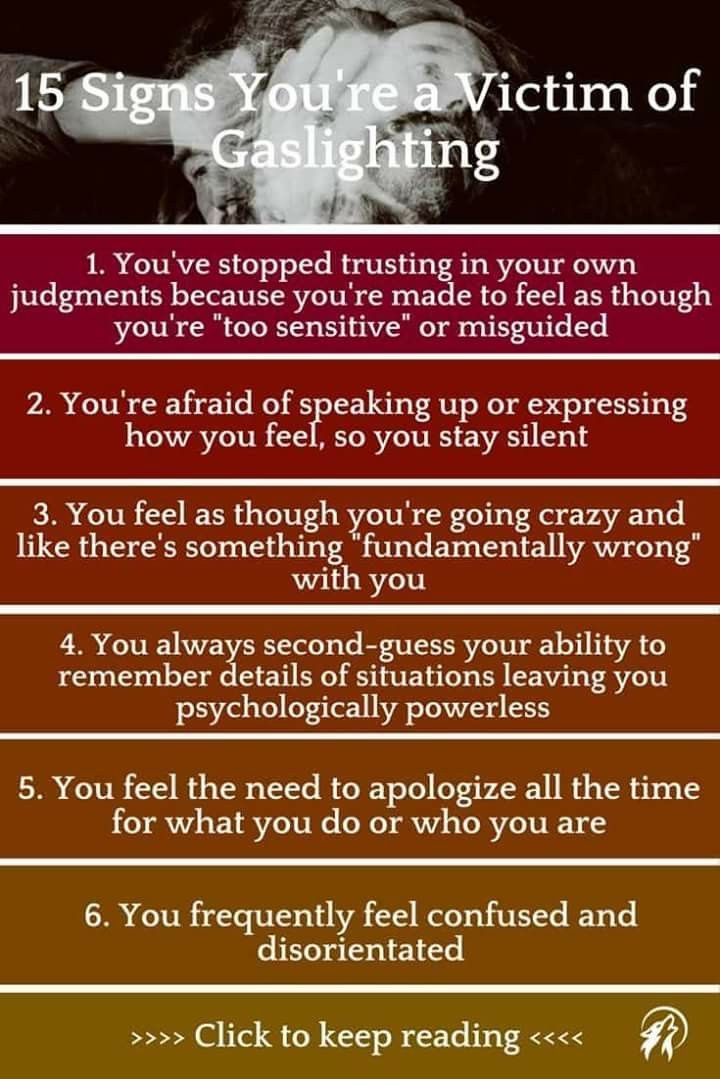 You might have a hard time enjoying life and lose sight of your sense of purpose.
You might have a hard time enjoying life and lose sight of your sense of purpose.
Someone engaging in narcissistic abuse often has little respect for boundaries. When you try to set or enforce limits, they might challenge them, completely ignore them, or give you the silent treatment until you do what they want. Eventually, you might give up on your boundaries entirely.
Once you end the relationship or get distance from a narcissistic parent, you promise yourself you won’t answer their calls and texts or see them at all.
If they know they can eventually wear you down, though, they might not let you go easily. Instead, they’ll keep calling and texting in the hopes of getting you to set aside your boundaries again.
If you’ve experienced narcissistic abuse, you might also have trouble setting healthy boundaries in your relationships with others.
Anxiety and depression commonly develop as a result of narcissistic abuse.
The significant stress you face can trigger persistent feelings of worry, nervousness, and fear, especially when you never know what to expect from their behavior.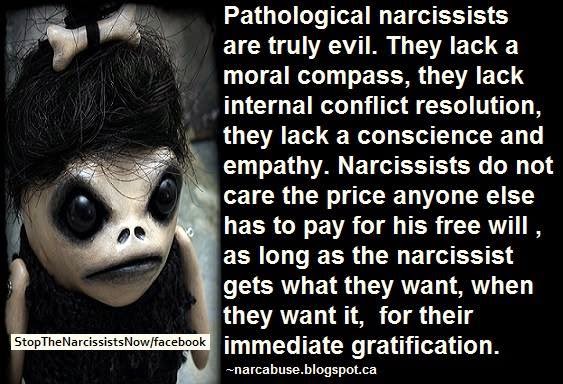
You might feel hopeless or worthless, lose interest in things that used to bring you joy, and have a hard time seeing hopeful outcomes for the future.
It’s also common to have a lot of confusion over what caused them to change so abruptly, especially if you don’t know much about narcissistic manipulation.
You might shoulder the blame for the abuse, perhaps believing their accusations that you must not care about them enough or blaming yourself for falling for their deception in the first place. Either can add to feelings of worthlessness and further diminish self-esteem.
Any kind of abuse can take a significant toll on mental and physical health. If your loved ones still doubt you or tell you to just move on, you may feel unheard and unsupported. This can make it hard to trust people again, leaving you feeling isolated and alone.
Whether you’re just beginning to notice the first signs of narcissistic manipulation or still trying to make sense of an abusive relationship you’ve already left, therapy can help you begin healing.
Therapy offers a safe space to:
- learn coping strategies to manage mental health symptoms
- practice setting healthy boundaries
- explore ways to rebuild your sense of self
A therapist who specializes in abuse recovery can validate your experience, help you understand that you aren’t at fault, and offer support through the early stages of recovery.
Get help now
You can also get emergency support 24 hours a day, 7 days a week from the National Domestic Violence Hotline.
For free, confidential help:
- call 800-799-7233
- text LOVEIS to 866-331-9474
- chat online
Crystal Raypole writes for Healthline and Psych Central. Her fields of interest include Japanese translation, cooking, natural sciences, sex positivity, and mental health, along with books, books, and more books. In particular, she’s committed to helping decrease stigma around mental health issues. She lives in Washington with her son and a lovably recalcitrant cat.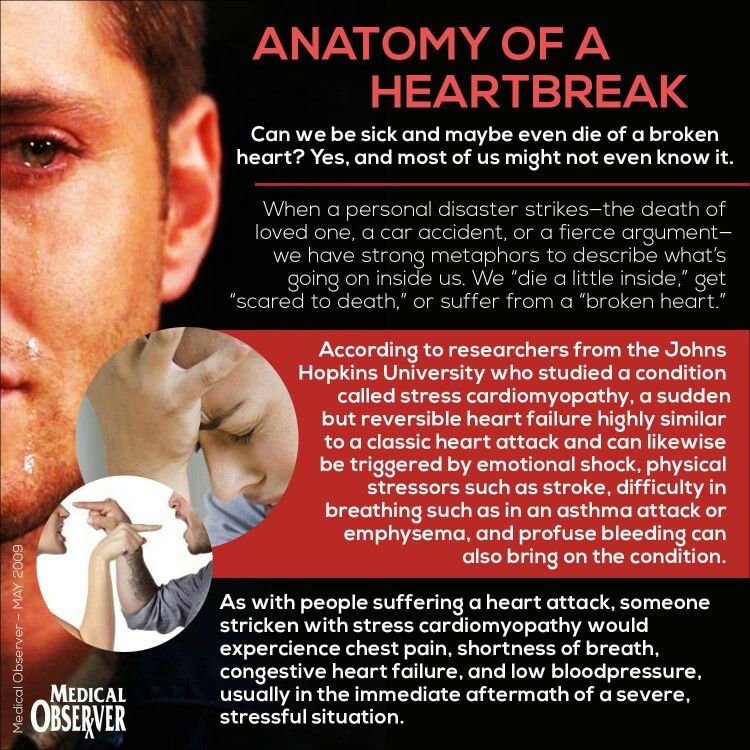
Narcissistic victim syndrome: what is it?
A man or woman suffering from Narcissistic Personality Disorder (NPD) exhibits patterns of abnormal or inappropriate behavior so monstrous that they cause serious injury to people who, in their grief, contact them.
Inappropriate behavior includes extremely insensitive exploitation of victims, the consequences of which have been given the name Narcissistic Abuse Victim Syndrome (or Narcissistic Victim Syndrome (VAS)). While much medical literature has been devoted to narcissistic personality disorder (NPD), little or nothing is known about Narcissistic Victim Syndrome (NPS). The Diagnostic and Statistical Manual of Mental Disorders (DSM-IV), published by the American Psychiatric Association, which is considered the "bible" for professionals, pays much attention to NPD. However, the DSM-IV is silent on how the behavior of narcissists affects those who live or work with them, and how such behavior affects their mental health. As a result of targeted research conducted by many psychotherapists, a number of characteristic features have been identified in victims of narcissistic abuse. The good news is that physicians are pushing for this syndrome to be included in the next version of the Diagnostic and Statistical Manual (in DSM-V, the previous fourth version was published in 2013) with the hope that standard guidelines will be developed for working with such patients. .
As a result of targeted research conducted by many psychotherapists, a number of characteristic features have been identified in victims of narcissistic abuse. The good news is that physicians are pushing for this syndrome to be included in the next version of the Diagnostic and Statistical Manual (in DSM-V, the previous fourth version was published in 2013) with the hope that standard guidelines will be developed for working with such patients. .
First, what do we mean by "syndrome"?
The word "syndrome" is of Greek origin: "syn" - together, "dramein" - to flee. Thus, a syndrome is a set of signs and symptoms that tend to "run together", and this combination is the result of physical, mental, emotional and mental abuse. In order to diagnose a patient who has been the victim of narcissistic abuse, the therapist must be able to recognize its signs and symptoms and gain an understanding of what happened in the patient's life as his story unfolded. Then therapists will be able to understand whether the client is a victim of narcissistic abuse or a less severe form of abuse and how this affected his mental well-being.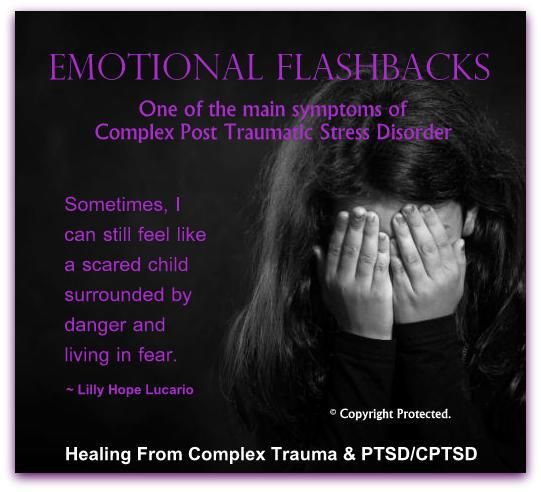
Do therapists have enough information about the effects of narcissism on victims?
If we talk about Ireland, I can confidently say: “Definitely not!”. Narcissistic personality disorder is predominantly dealt with by psychiatrists and psychologists working in the public psychiatric service; therefore, it is not surprising that a diagnosed narcissist rarely voluntarily appears in the office of a psychotherapist who does not work in the official system. At the same time, mental health workers focus on the vulnerabilities and characteristics of interaction with a narcissistic patient, their priority is to take care of him, and not about his victim, and victims often turn to other specialists.
More often than not, victims seek the advice or help of psychotherapists not because they are aware of SJS, but because they cannot manage their own lives. I have spoken to many psychotherapists, and while they have an understanding of narcissism, none admit to being qualified to identify signs of narcissistic behavior and its effect on victims, let alone work with a victim of narcissistic abuse.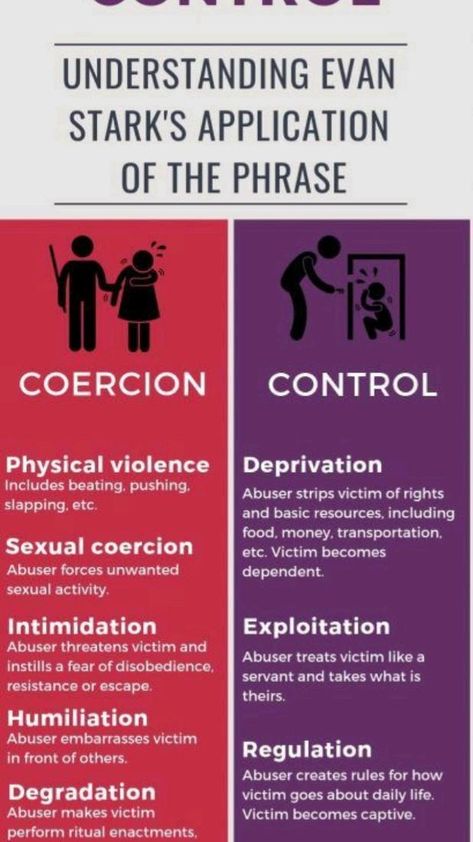 Since most educational programs in psychotherapy in Ireland include a minimum of information on this topic, and the fact that little, if not nothing, has been written about victims of narcissistic abuse in the medical literature, it has been my observation that most therapists learn from their own experience, mistakes, pain working with clients suffering from this syndrome. If you read any narcissistic abuse survivor support group forum, you will notice that the victims constantly say that the therapists do not understand the depth of their suffering and rarely use the term "narcissistic abuse".
Since most educational programs in psychotherapy in Ireland include a minimum of information on this topic, and the fact that little, if not nothing, has been written about victims of narcissistic abuse in the medical literature, it has been my observation that most therapists learn from their own experience, mistakes, pain working with clients suffering from this syndrome. If you read any narcissistic abuse survivor support group forum, you will notice that the victims constantly say that the therapists do not understand the depth of their suffering and rarely use the term "narcissistic abuse".
Understanding Narcissistic Victim Syndrome (NPS) first requires understanding Narcissistic Personality Disorder (NPD). To become a competent therapist working with victims of narcissistic abuse, it is vital to study the full spectrum of narcissistic behavior. The spectrum of narcissism is a continuum with healthy manifestations of narcissism at one extreme and pathological narcissistic personality disorder at the other. Meanwhile, in order to traumatize the victim, the narcissist does not have to demonstrate all the features characteristic of the pronounced pathological stage of narcissism. Therefore, therapists must be aware of the full range of narcissistic manifestations and the dynamics of the relationship between the narcissist and his victim. I am talking about narcissists who develop such traits as a sense of entitlement, a need for control and exercise of power, grandiosity, and how these traits are embodied in behavior whose purpose is to support fantasies of omnipotence and protect a vulnerable ego.
Meanwhile, in order to traumatize the victim, the narcissist does not have to demonstrate all the features characteristic of the pronounced pathological stage of narcissism. Therefore, therapists must be aware of the full range of narcissistic manifestations and the dynamics of the relationship between the narcissist and his victim. I am talking about narcissists who develop such traits as a sense of entitlement, a need for control and exercise of power, grandiosity, and how these traits are embodied in behavior whose purpose is to support fantasies of omnipotence and protect a vulnerable ego.
Due to the fact that the narcissist did not receive proper care in childhood (whether it was a lack of care or overprotection), he did not form a true "True Self", which is necessary for a full adult life. Ignoring the basic needs of the child prevented the development of healthy self-esteem and the ability to express themselves directly. Narcissists spend a lot of energy on defense. One of these defenses is to maintain a "False Self" - a behavioral mask that allows you to appear authentic in the eyes of other people. However, this construction forces the narcissist to be constantly on the defensive against being "recognized", making him extremely vulnerable to narcissistic trauma. Anything perceived as a threat (real or imagined) to the narcissist's self-image or self-presentation becomes a source of narcissistic trauma. Thus, in order to maintain their own illusions and protect their false self from any deviation from the Ideal Ego, the narcissist demands from his victims positive mirroring, strokes and positive responses; and the attention shown by the victims is precisely the narcissistic resource.
However, this construction forces the narcissist to be constantly on the defensive against being "recognized", making him extremely vulnerable to narcissistic trauma. Anything perceived as a threat (real or imagined) to the narcissist's self-image or self-presentation becomes a source of narcissistic trauma. Thus, in order to maintain their own illusions and protect their false self from any deviation from the Ideal Ego, the narcissist demands from his victims positive mirroring, strokes and positive responses; and the attention shown by the victims is precisely the narcissistic resource.
What is a narcissistic resource?
The narcissistic resource is an essential attribute of narcissism, it protects the narcissist from feelings of shame or rejection. The narcissist needs a resource to maintain his fragile ego, and this is provided in two different ways:
Primary Narcissistic Supply is the attention on which the narcissist is dependent. Attention can be social in nature (eg recognition, celebrity, fame or shame, etc.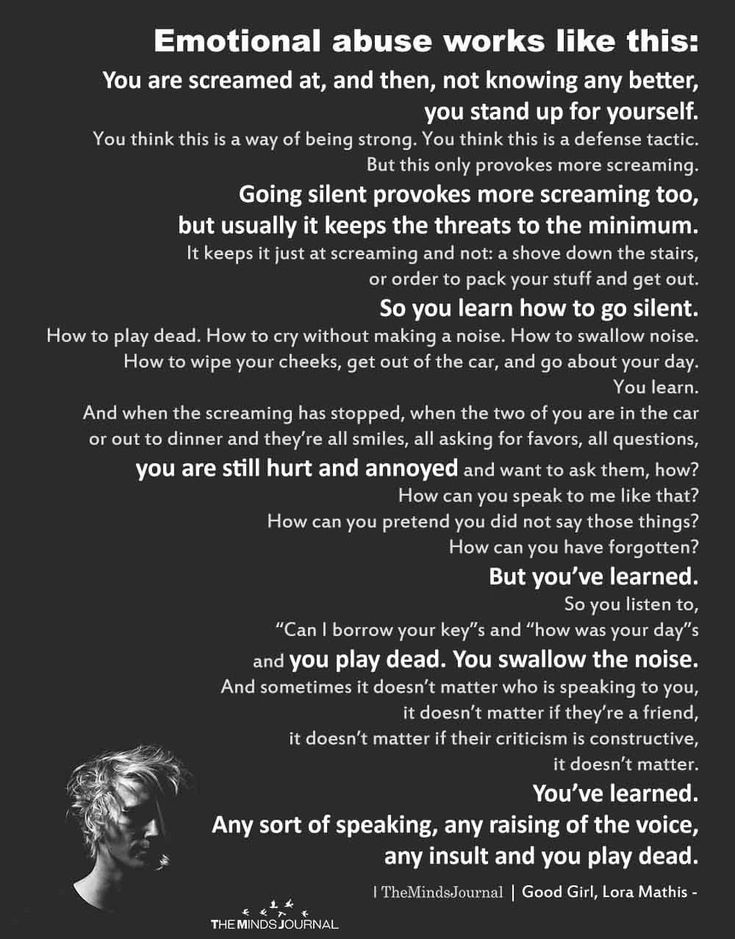 ) or personal (eg admiration, flattery, recognition, fear, disgust, etc.).
) or personal (eg admiration, flattery, recognition, fear, disgust, etc.).
Secondary Narcissistic Supply is obtained from people or circumstances that provide it on a regular basis (eg spouse, children, friends, colleagues, partners, clients, etc.). This kind of resource allows the narcissist to maintain a normal existence, becomes a source of pride, financial security, social success and the connections he needs.
However, the narcissistic resource is provided not only by people, it can be any inanimate object or circumstances that can attract attention and admiration to the narcissist (for example, an expensive car, real estate, clothes, belonging to a church community, sect, club or business community ). In short, everything that symbolizes position in society is a "narcissistic resource" for the narcissist.
The therapist must understand that this behavior goes hand in hand with the strongest narcissistic multi-addiction. Possessed by the illusion of a "False Self" and an inflated opinion of their own superiority, the need to exercise power and control, the narcissist becomes susceptible to all kinds of obsessions, behaviors and phenomena; such as addiction to resource provider, grandiosity, control, risky driving, anger, perfectionism, attention, fame, etc. Without a comprehensive examination of narcissism, there is no way for the therapist to understand the extent of its devastating effects on the victims they work with, these effects can be so strong that they lead to the development of the narcissistic victim syndrome.
Without a comprehensive examination of narcissism, there is no way for the therapist to understand the extent of its devastating effects on the victims they work with, these effects can be so strong that they lead to the development of the narcissistic victim syndrome.
I am currently doing extensive work in this area and see it as my mission to pass on what I have learned to other therapists to make their work with victims of this type of abuse more effective. I am not trying to "stigmatize" people suffering from narcissistic personality disorder, on the contrary, I suggest that they are also victims of past abuse and they also experience daily torment. I sincerely hope that my research will promote greater compassion for both narcissists and their victims, and I want to help therapists improve their diagnosis and treatment of narcissistic abuse.
What is narcissistic abuse victim syndrome?
First, let's define what a "victim" is? “A victim is a person who has been harmed, injured, or killed as a result of a crime, accident, or other event or act.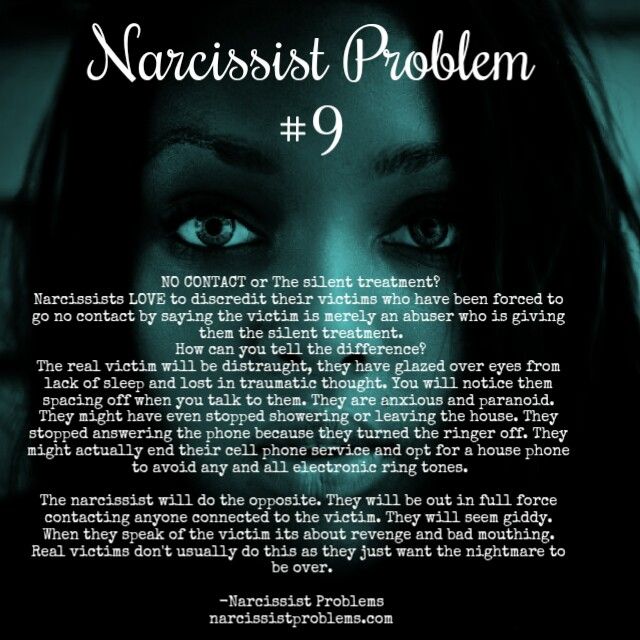 ” Thus (based on this definition), I think it's safe to say that any person who has gone through narcissistic abuse, who has been harmed, traumatized, and in some cases even died by the narcissist's behavior, is indeed a victim.
” Thus (based on this definition), I think it's safe to say that any person who has gone through narcissistic abuse, who has been harmed, traumatized, and in some cases even died by the narcissist's behavior, is indeed a victim.
When I work with people who are victims of narcissistic abuse, one of the most common things I notice about them is that they feel completely overwhelmed because they don't understand what has happened to them. I believe that before they can begin to piece themselves together, it is vital for the therapist to provide the client with information about narcissistic personality disorder (what it is, how it manifests, what causes it, etc.) so that clients can find out what really happened in their personal history. In fact, without such information, it is almost impossible to return self-esteem to a healthy level, and therefore there is a great risk of leaving the victim vulnerable to further retraumatization and possible provocations in relationships with other narcissists.
If a person is once the victim of narcissistic abuse (whether in childhood or later in life), the victim syndrome kicks in unconsciously and prompts them to start doing the "fancy narcissistic dance", leaving them defenseless against possible further abuse. The therapist needs to carefully shed light on how people accept an invitation to a dance that makes them victims. To reiterate, a "narcissistic victim" is any person who has been harmed, traumatized, or died as a result of an interaction with a narcissist (regardless of the severity of the abuser's narcissistic traits).
The victim must understand that the "dance of codependency" involves two people, a rescuer/reformer (victim) and a taker/controller (narcissist, addict), who are perfectly suited to each other as dance partners - this is where the madness begins. The consequences for the victim, who does not understand the essence of the intricate dance, lead to the fact that, regardless of the desire to avoid "unhealthy" partners, she will again return to the usual dance floor; the only change may be that she will dance to different tunes, but the personalities of her partners will remain the same.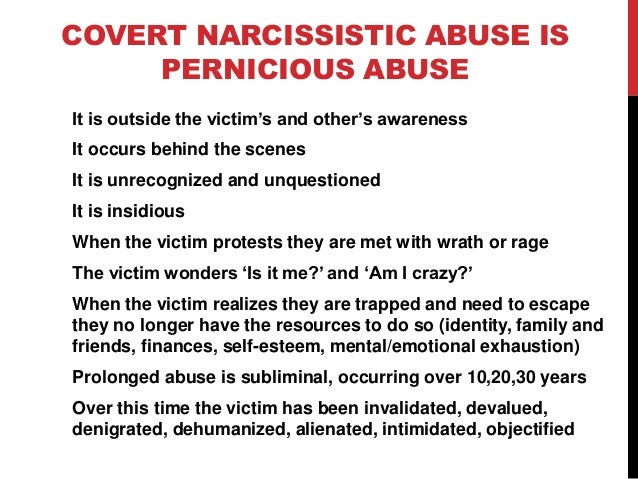
The therapist must take seriously the fact that narcissism is a very complex disorder that causes great anguish both to the person suffering from it and to those who are forced to deal with narcissistic behavior on a daily basis. When I talk about narcissistic abuse (abuse that can lead to Narcissistic Victim Syndrome), I'm talking about a very insidious form of abuse. By cunning, I mean the implicit, hidden, and often mediated nature of such abuse. This type of abuse is often subtle and subtle because the narcissist will go to great lengths to avoid public exposure. In the person of the narcissist we have Dr. Jekyll and Mr. Hyde (who had just shown love and suddenly flared up with hatred), and this fact causes great harm to the victim. Misunderstanding, fear, stress, frustration, inner turmoil and chaos that the victim experiences force her to “sit on pins and needles” in an attempt to avoid possible conflicts with a narcissistic partner. Long-term relationships are especially damaging to the victim.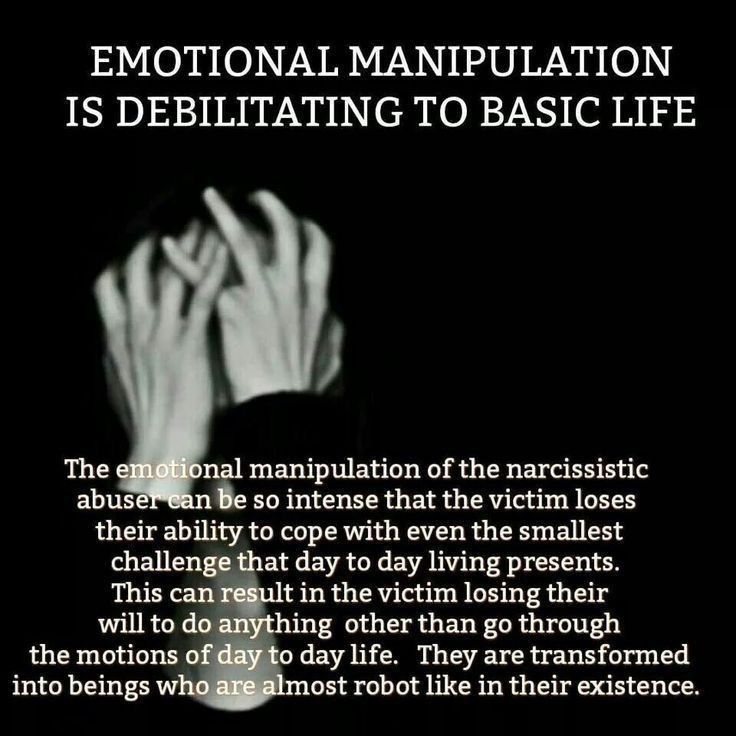 I compare narcissism to a parasitic worm that penetrates the skin: invisible to the eye, it can freely injure or slowly eat its donor, resulting in injury or illness. By the way, some daffodils continue to live in their victim even after parting, as if the “seeds” sown by them germinate in it.
I compare narcissism to a parasitic worm that penetrates the skin: invisible to the eye, it can freely injure or slowly eat its donor, resulting in injury or illness. By the way, some daffodils continue to live in their victim even after parting, as if the “seeds” sown by them germinate in it.
However, when we talk about a victim of narcissistic abuse, we mean an abuse committed by a person with a personality disorder, and, as a rule, this disorder was not diagnosed in him by doctors, therefore, unidentified as a narcissist, this person is present in society ( i.e. at home, at work, in an organization, in a social environment, etc.). It is vital to understand that NPD is a serious mental disorder, with an inflated sense of self-importance and a deep need for attention and admiration. The narcissist considers himself better than other people, whoever they are (i.e. better than spouse, children, parents, siblings, friends, colleagues, bosses, etc.). The people around him are simply objects to satisfy his immediate needs for narcissistic resource, and the narcissist will use any form of abuse to satisfy himself without being burdened with guilt, empathy, or conscience.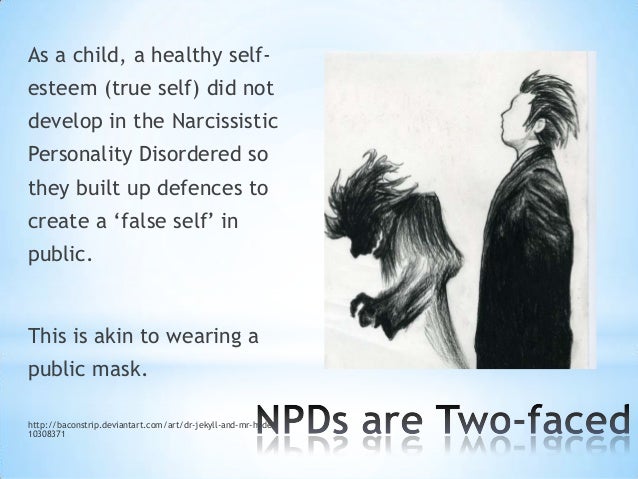
Do victims of narcissistic abuse have anything in common?
Do you think that such clients come into the office with the words “Hi, I am a victim of narcissistic abuse”? Of course not! They are like any client entering your therapy room for the first time. They will most likely voice a fairly simple and mundane problem, such as feeling overwhelmed, prone to anxiety attacks, or feeling powerless. They have no idea that they ended up in a “war zone” on the same team as a narcissistic saboteur (were before or are now). However, do not be afraid that as a therapist you will not be able to cope with this syndrome. If you have the appropriate completed education, then you should have all the skills necessary to work with this syndrome. Armed with the knowledge of narcissistic abuse and practical trauma skills, you can help any victim of narcissistic abuse.
Like all therapist clients, victims of narcissists have a story to tell; therefore, they need someone who will become an active listener and explain what really happened to them.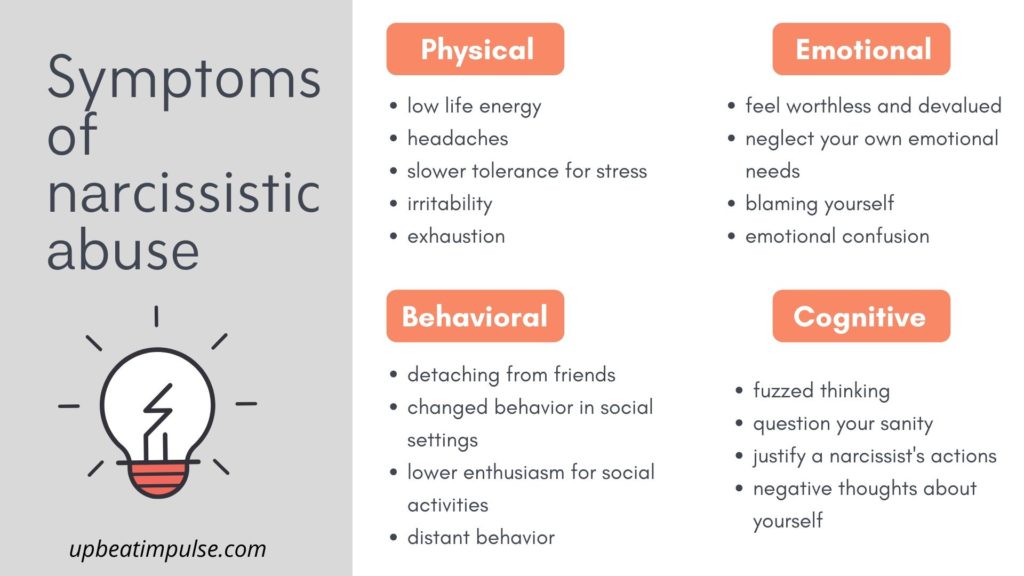 In my opinion, this is a test of the human experience, which is vitally important to do from the very beginning. These clients are not insane, but they often exhibit nervousness or agitation, increased levels of anxiety, and low self-esteem. Often they demonstrate obsessive-compulsive behaviors, are prone to phobias, panic attacks, so from time to time it may actually seem that they are going crazy. Perhaps they suffer from insomnia and have an eating disorder, so you may notice that some of them are underweight (anorexia as a means of gaining some control), others are overweight (as a result of overeating for self-complacency).
In my opinion, this is a test of the human experience, which is vitally important to do from the very beginning. These clients are not insane, but they often exhibit nervousness or agitation, increased levels of anxiety, and low self-esteem. Often they demonstrate obsessive-compulsive behaviors, are prone to phobias, panic attacks, so from time to time it may actually seem that they are going crazy. Perhaps they suffer from insomnia and have an eating disorder, so you may notice that some of them are underweight (anorexia as a means of gaining some control), others are overweight (as a result of overeating for self-complacency).
As you work with the NLS, you will encounter emotions such as shock, anger, fear, and guilt. Often, victims show signs of post-traumatic stress disorder (PTSD) or co-dependent post-traumatic stress disorder (Co-PTSD). The symptoms of PTSD are usually grouped into three main categories: over-experiencing (flashbacks, hallucinations, nightmares, etc.), avoidance (people, places, thoughts, loss of interest, etc. ), and over-excitation (excessive emotionality, problems with relaxation, difficulty sleeping and concentrating, temper tantrums, anxiety, panic attacks, etc.). You may also notice that your client has a tendency to "dissociate" during a conversation. In this way, the traumatized person tends to "separate himself from the experience": he withdraws from his own emotions, bodily manifestations, or environment. This behavior is called "derealization" (derealization).
), and over-excitation (excessive emotionality, problems with relaxation, difficulty sleeping and concentrating, temper tantrums, anxiety, panic attacks, etc.). You may also notice that your client has a tendency to "dissociate" during a conversation. In this way, the traumatized person tends to "separate himself from the experience": he withdraws from his own emotions, bodily manifestations, or environment. This behavior is called "derealization" (derealization).
Dissociation can be a direct result of trauma, often experienced repeatedly in various forms during childhood narcissistic traumas (ie physical, psychological and sexual abuse). Dissociation is an automatic and effective defense mechanism against unbearably severe stress to which the child was subjected; the person seems to “jump out” of the body in order to separate from the unbearable reality of the ongoing abuse; dissociating, i.e. partially excluding himself from the situation, the child gets the opportunity to endure severe traumatic experiences.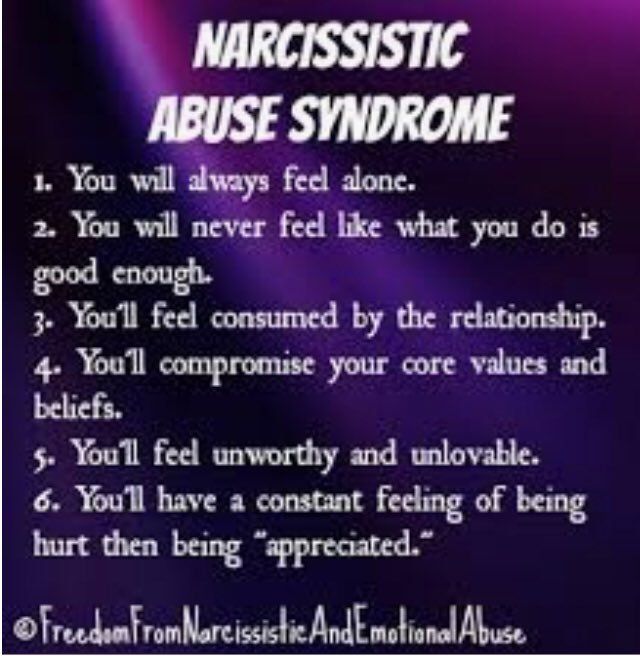
I once worked with a client who was sexually abused as a child by a narcissistic father. He called her at the moment when she was playing on the street with friends, raped her, and then sent her back to play. She decided that during the sexual abuse, she would jump out of her body, sit on the wardrobe and watch what happened to the child in bed. She called the baby in bed "brave girl" and the baby on the closet "good girl." The brave girl never left the house, but the good girl went back to playing with her friends.
This defense mechanism protects the child's ego from complete annihilation at moments when its nervous system is strained to the limit. However, long-term dissociation can lead to disruption of the psyche and regulatory mechanisms. Dissociation is an effective strategy to protect a person during times of crisis, but unfortunately, trauma survivors resort to dissociation too often - every time, in every stressful situation, and as a result, dissociation is reinforced as a habitual automatic reaction to stress.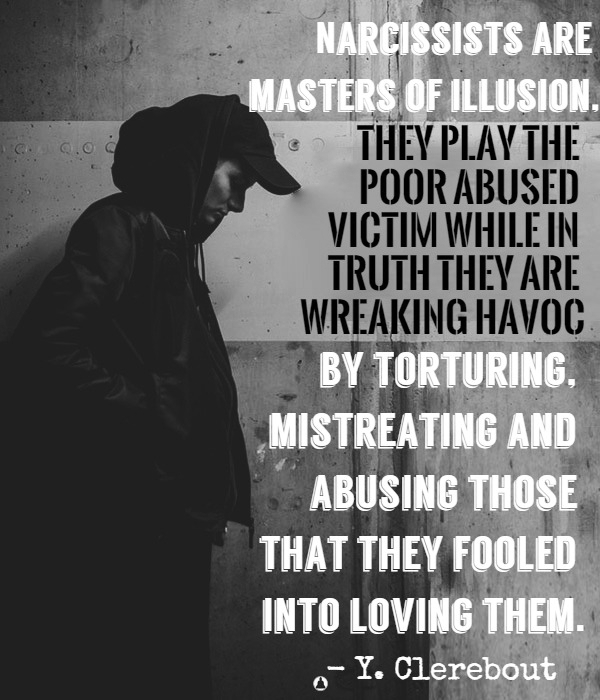 The bodily numbness that accompanies dissociation is not the preferred strategy in absolutely all situations, because it affects the ability to physically defend oneself when confronted with a real threat. Of course, the degrees of dissociation are different - from daytime fantasies to out-of-body to derealization in the case of a constantly experienced experience of dissociation. In the therapist's office, dissociation seriously interferes with the client's inclusion in the process, and if this occurs, it can become a hindrance to therapy. First, the therapist must build a trusting relationship with the client, provide him with a sense of security, so as not to shake his nervous system. By explaining what dissociation is, the therapist can gently draw the client's attention to the moments of his "flight". Creating and introducing new skills (through the game) will take a lot of time. The consequences of narcissistic abuse can include any of the following: low self-esteem, self-harm (self-harm), suicidal thoughts, chronic pain, PTSD, depression, and somatization.
The bodily numbness that accompanies dissociation is not the preferred strategy in absolutely all situations, because it affects the ability to physically defend oneself when confronted with a real threat. Of course, the degrees of dissociation are different - from daytime fantasies to out-of-body to derealization in the case of a constantly experienced experience of dissociation. In the therapist's office, dissociation seriously interferes with the client's inclusion in the process, and if this occurs, it can become a hindrance to therapy. First, the therapist must build a trusting relationship with the client, provide him with a sense of security, so as not to shake his nervous system. By explaining what dissociation is, the therapist can gently draw the client's attention to the moments of his "flight". Creating and introducing new skills (through the game) will take a lot of time. The consequences of narcissistic abuse can include any of the following: low self-esteem, self-harm (self-harm), suicidal thoughts, chronic pain, PTSD, depression, and somatization.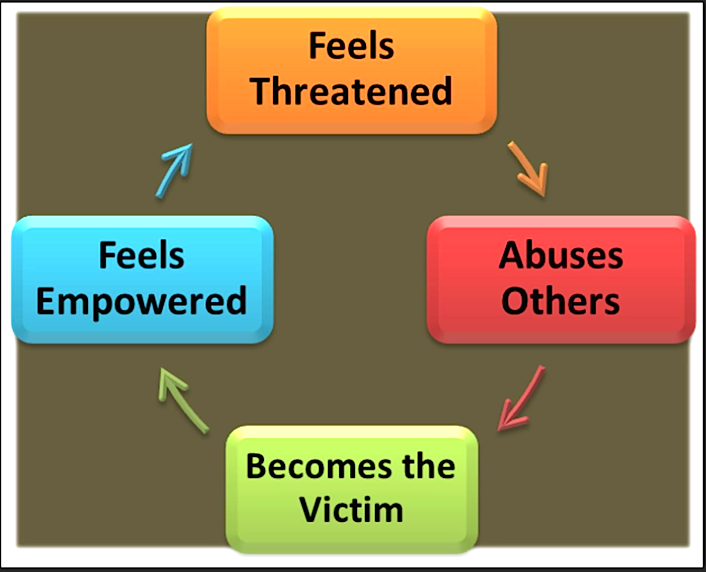
Somatization has many physical manifestations that the victim may experience, and with them she usually goes to the local therapist. Doctors, for the most part, cannot make a correct diagnosis, because they do not understand the essence of what is happening, they cannot classify symptoms that have a psychological cause. When no obvious organic pathology is found, patients are diagnosed with a psychosomatic illness. Somatic manifestations are the main problem of the general health of the victim of the narcissist. Many manifestations of illness result from repressed memories of narcissistic abuse, usually experienced in childhood. For example, as a response to a fear of narcissistic abuse, a child may develop severe seizures, and then, as an adult, may experience a seizure without obvious causes that the doctor cannot determine. In this case, it is most likely that repressed experiences manifest themselves in this way, which the person himself does not know about, but from which his unconscious is desperately trying to free himself.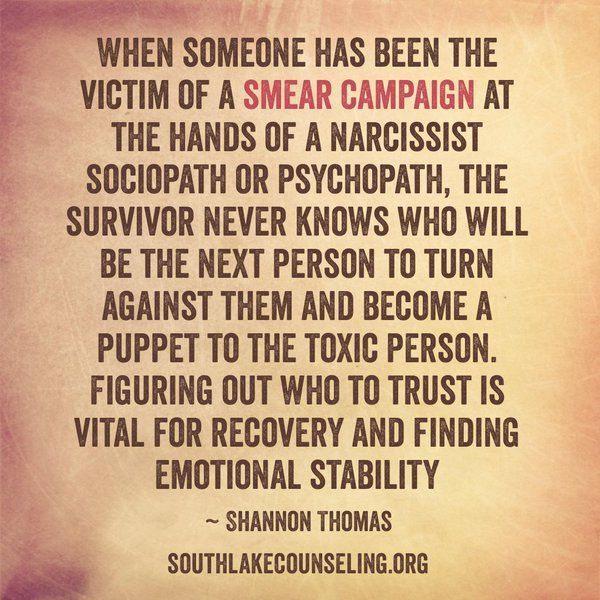 As a rule, such clients with somatic problems go from doctor to doctor in search of effective treatment. Many knowledgeable doctors recognize that in fact often the root cause lies in the emotional area, and then they refer the patient to a psychotherapist. Very often the symptoms disappear once the emotional cause is revealed, and repressed memories have a chance to surface in the safe space of therapy.
As a rule, such clients with somatic problems go from doctor to doctor in search of effective treatment. Many knowledgeable doctors recognize that in fact often the root cause lies in the emotional area, and then they refer the patient to a psychotherapist. Very often the symptoms disappear once the emotional cause is revealed, and repressed memories have a chance to surface in the safe space of therapy.
Clients who have suffered narcissistic abuse are likely to experience feelings of shame and resentment, partly because of the abuser's own shame projected onto them. They also tend to take responsibility and are prone to self-blame because they are used to being responsible for the narcissist's behavior. Every time the narcissist gets angry, the victims claim with no hesitation that it is their fault (i.e. the narcissist says, “It’s your fault because you have to admit that you wanted to upset me, now look what you have done.” "). Victims feel humiliated and powerless and experience intense guilt when talking about their abuser, to the point of wanting to defend him. Often they are unhappy with themselves because they think they are not good enough, not smart enough, not pretty enough, and so on.
Often they are unhappy with themselves because they think they are not good enough, not smart enough, not pretty enough, and so on.
It is not uncommon for victims to be traumatized by more than one abuser. They can talk about previous and current relationships in which the abuse is present. Quite often, the first injury to the victim was inflicted by the narcissist during childhood. Perhaps one of the parents, grandparents, brother, friend of the victim, etc. After being re-traumatized, victims often internalize the belief that something is wrong with them and that they deserve to be abused, so they resignedly accept their fate. It becomes obvious that they were unable to reveal their personal and professional potential, including because they had to constantly be in the shadow of the aggressor, who relegated them to the background. They are used to living in the shadows without knowing why. These are some of the signs that you can observe. But there are more complex signs that are more difficult to recognize.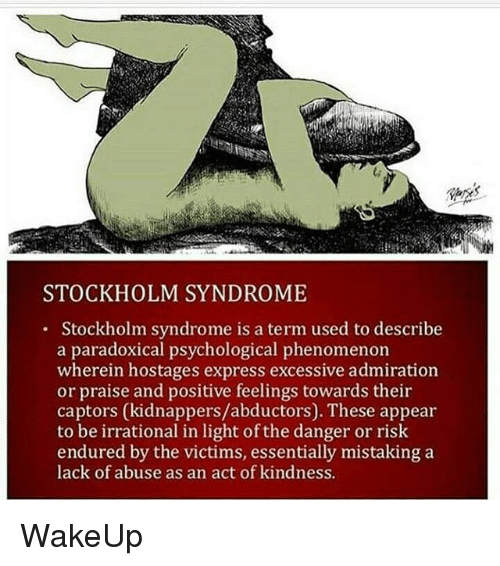
To diagnose Narcissistic Victim Syndrome, several signs must be identified.
Any of the features mentioned above can be found in almost everyone, however, if there is a combination, then FLS can be diagnosed. These signs include many traumatic symptoms (avoidance behavior, loss of interest, feeling disconnected, feeling limited in the future, difficulty sleeping and eating, irritability, hypervigilance, irritability, flashbacks, hopelessness, psychosomatic illness, self-harm, suicidal thoughts, etc.). d.).
As you work together, you may notice that the victim is constantly protective of their abuser. This is meaningless from the point of view of pair interaction, but the meaning of this phenomenon must be sought in the field of the psyche. You have witnessed the manifestation of a psychological mechanism known as "Stockholm Syndrome". Stockholm syndrome involves the victim in an emotional connection with the narcissist; such "traumatic attachment" is known to be a survival strategy for the victim of narcissistic abuse and bullying.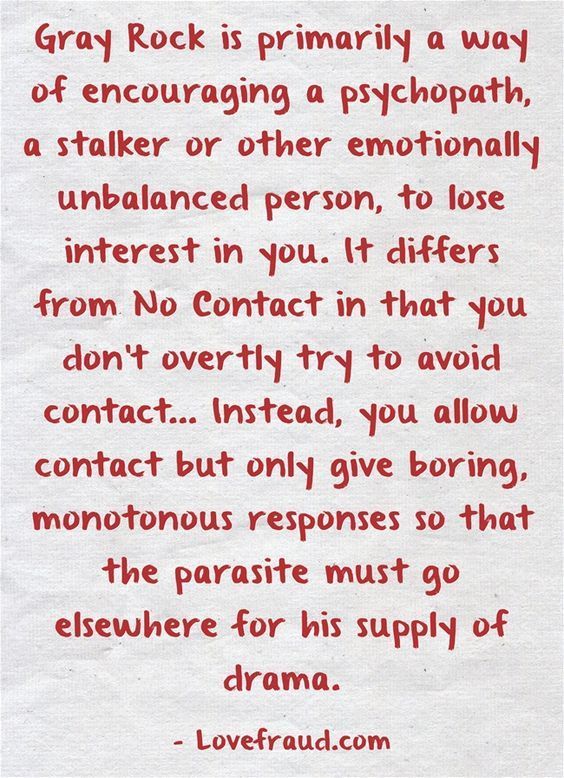 Being constantly in close proximity to a hostile person, the victim very soon realizes that her abuser is actually able to carry out his threats, which means that she is actually in danger. Frightened by physical and psychological threats, the victim feels lost and isolated. At the same time, she vaguely feels that she can get some care from the abuser, which both encourages the victim to feel affection for the aggressor and gives her a false sense of security. To understand the reasons why a victim continues to support, protect, and even love an abusive person and to get rid of him, one must understand what, in essence, is Stockholm syndrome. It is important to recognize that it is a very complex unconscious defensive response necessary for survival. Some therapists ask clients why they have stayed in a dysfunctional relationship for so long. Such questions are harmful in themselves, and at the same time they are a sign that the therapist has no idea about the phenomenon, which is called "cognitive dissonance".
Being constantly in close proximity to a hostile person, the victim very soon realizes that her abuser is actually able to carry out his threats, which means that she is actually in danger. Frightened by physical and psychological threats, the victim feels lost and isolated. At the same time, she vaguely feels that she can get some care from the abuser, which both encourages the victim to feel affection for the aggressor and gives her a false sense of security. To understand the reasons why a victim continues to support, protect, and even love an abusive person and to get rid of him, one must understand what, in essence, is Stockholm syndrome. It is important to recognize that it is a very complex unconscious defensive response necessary for survival. Some therapists ask clients why they have stayed in a dysfunctional relationship for so long. Such questions are harmful in themselves, and at the same time they are a sign that the therapist has no idea about the phenomenon, which is called "cognitive dissonance".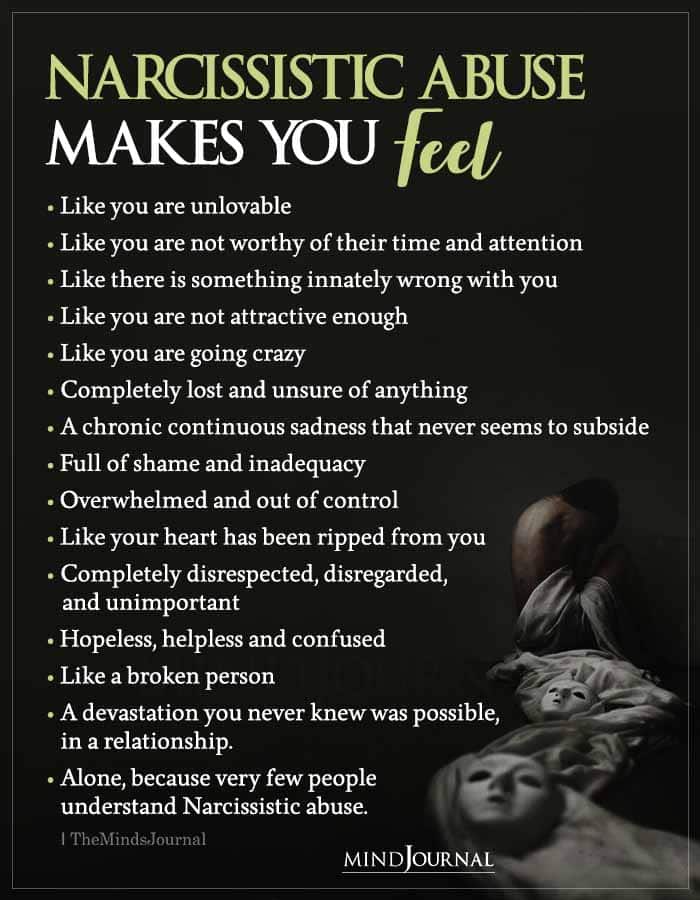
Cognitive dissonance is another unconscious defense mechanism that helps to survive. Imagine what it's like to live in a dangerous war zone where all forms of power and control are used against you (intimidation; emotional, physical and intellectual abuse; isolation, economic abuse, sexual abuse, coercion, control, etc.). The threat of abuse constantly hangs over you. Experiencing this situation creates many internal conflicts in the victim that require protection. For example, a woman living with an abusive narcissist hates this state of affairs. However, in real horror at the aggressive reprisals that a narcissist-abuser can inflict on her if she tries to leave him, she most likely decides to stay with him. Cognitive dissonance manifests itself through rationalization: on the one hand, she hates these painful relationships and everything related to abuse; at the same time, on the other hand, she convinces herself that he is being aggressive because he loves and cares for her.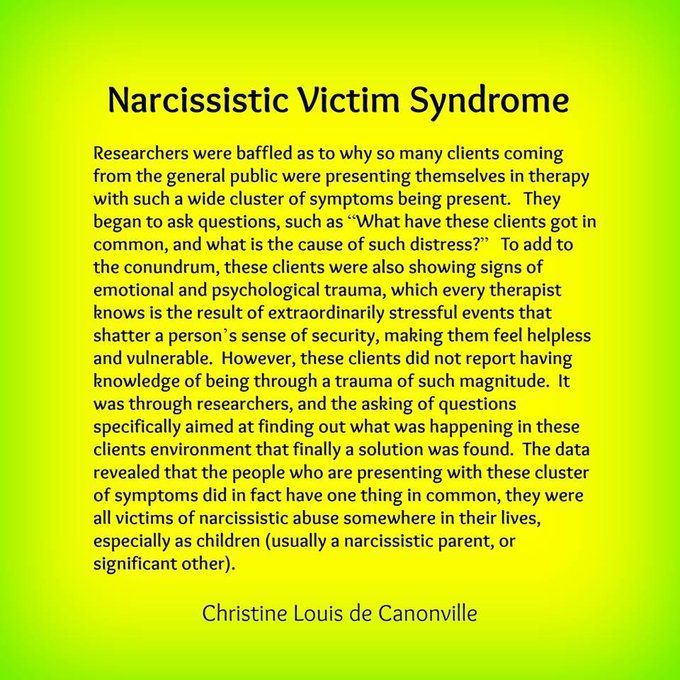 This internal dialogue reduces the victim's anxiety, allowing her to get closer to the abuser to the point where she is ready to protect him from the outside world if people try to save her or support her desire to leave the abuser. As a result, she experiences a serious conflict between her emotional and rational self-perceptions. Her "cognitive dissonance" is a sign of the disharmony that the victim experiences as a result of the incessant struggle of two conflicting ideas; those. the victim understands that she must get out of the situation of abuse, but also understands that this is fraught with great danger (perhaps also in relation to her children). When two strategies are present at the same time (Stockholm syndrome and cognitive dissonance), the victim firmly believes that such a relationship is not only acceptable, but also vital to her survival. She becomes so entangled in the relationship with the abuser that she feels like her world (intellectual and emotional) will collapse if the relationship ends.
This internal dialogue reduces the victim's anxiety, allowing her to get closer to the abuser to the point where she is ready to protect him from the outside world if people try to save her or support her desire to leave the abuser. As a result, she experiences a serious conflict between her emotional and rational self-perceptions. Her "cognitive dissonance" is a sign of the disharmony that the victim experiences as a result of the incessant struggle of two conflicting ideas; those. the victim understands that she must get out of the situation of abuse, but also understands that this is fraught with great danger (perhaps also in relation to her children). When two strategies are present at the same time (Stockholm syndrome and cognitive dissonance), the victim firmly believes that such a relationship is not only acceptable, but also vital to her survival. She becomes so entangled in the relationship with the abuser that she feels like her world (intellectual and emotional) will collapse if the relationship ends.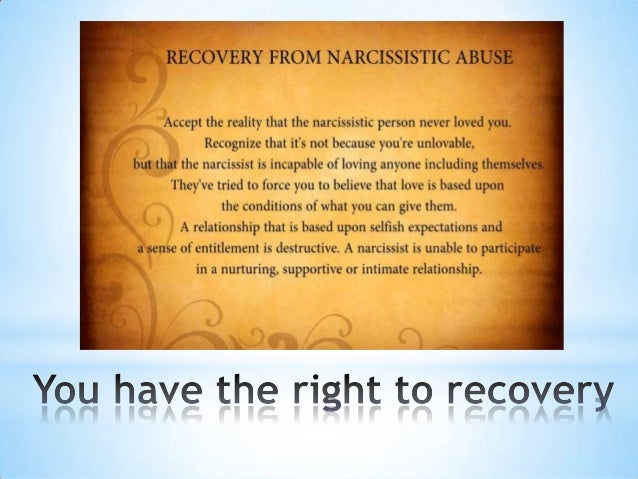 This explains the reasons why the victim is afraid of people trying to save her from the abuser, as well as the circumstances of the development of cognitive dissonance and the abuser's defense.
This explains the reasons why the victim is afraid of people trying to save her from the abuser, as well as the circumstances of the development of cognitive dissonance and the abuser's defense.
In the process of therapeutic work, you may find another symptom - it may turn out that the client feels insecure, constantly double-checking himself even in the most insignificant situations. For example, when you open the door for a client, he may ask: “Did I come at the appointed time?”. You may also notice that even after a detailed discussion, the client asks for confirmation that he understood you correctly. The client's self-confidence is so low that he has difficulty making simple decisions. You should be aware that if this is happening, there may be another sign of narcissistic abuse called gaslight.
The gaslight method is a form of psychological abuse used by the narcissist to arouse in his victim a feeling of intense anxiety and confusion and lead him to stop trusting his own memory, perception or judgment. Gaslight happens in any relationship between people of any gender. Two people are involved in this: a gas lighter (daffodil) and a gas burner (victim). The lighter is always right, this is how she maintains her power and feels in good shape; at the same time, the burner surrenders itself to the power of the lighter, therefore seeking approval for its own safety. This interaction allows the lighter to create a reality for the burner.
Gaslight happens in any relationship between people of any gender. Two people are involved in this: a gas lighter (daffodil) and a gas burner (victim). The lighter is always right, this is how she maintains her power and feels in good shape; at the same time, the burner surrenders itself to the power of the lighter, therefore seeking approval for its own safety. This interaction allows the lighter to create a reality for the burner.
"Gaslight Tango" - one of the narcissistic games that unfolds gradually over a long time, this game (or dance) allows the narcissist to define and shape the reality of his victim, destroying his way of thinking. For the victim, the gaslight begins with a stage of distrust, i.e. something strange happens during the gaslight, but the victim cannot figure out what it is. In the next stage, while the victim still has enough fortitude to resist the narcissist and protect himself from gaslight manipulation, the narcissist gradually begins to deliberately break her defenses and confuse her (i.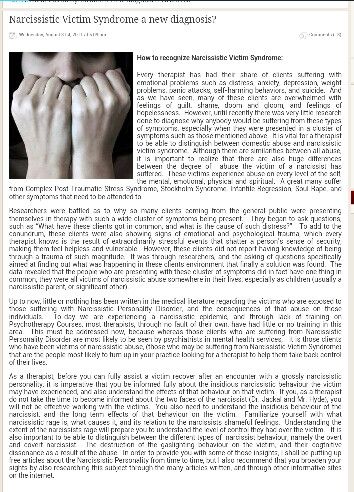 e. says, for example, "You are too sensitive", " Are you really crazy" or "Did I ever say you're grimacing?"). Or the narcissist may play a trick by moving or hiding things, and when the victim asks if he took them, the narcissist denies, claiming that he has never seen these things. Gradually, the victim, unable to recognize the game, ceases to trust himself. The final stage is depression. By this point, the victims no longer understand who they are and feel broken and isolated. They suspect that they can no longer do anything right, do not trust their own intellect, their perception of reality is distorted.
e. says, for example, "You are too sensitive", " Are you really crazy" or "Did I ever say you're grimacing?"). Or the narcissist may play a trick by moving or hiding things, and when the victim asks if he took them, the narcissist denies, claiming that he has never seen these things. Gradually, the victim, unable to recognize the game, ceases to trust himself. The final stage is depression. By this point, the victims no longer understand who they are and feel broken and isolated. They suspect that they can no longer do anything right, do not trust their own intellect, their perception of reality is distorted.
Gaslight is a serious method of influencing consciousness; it is similar to some of the brainwashing, interrogation and torture practices that have been practiced for decades by the US CIA and religious sects. The narcissist resorts to gaslighting as a deliberate and cruel way to manipulate the victim's mind. It instills in the victim such a strong self-doubt that eventually he becomes unable to trust his own perception.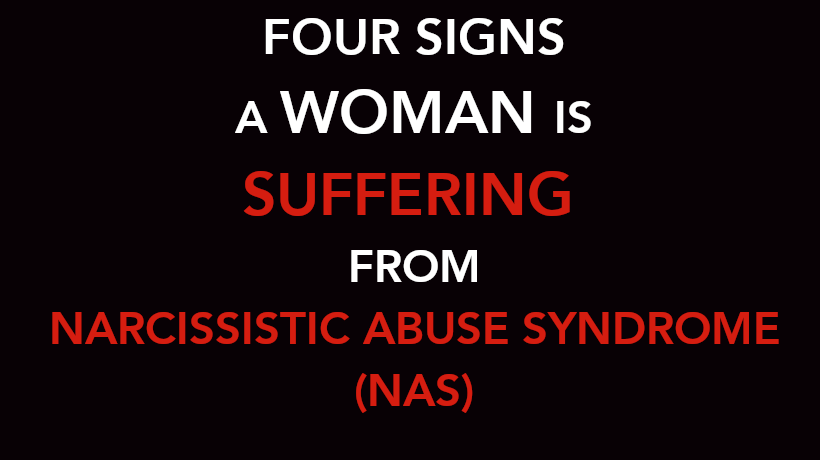 At this stage, the victim begins to doubt himself, his thoughts, opinions, ideas, ideals. Often she becomes convinced of her own intellectual weakness and falls into a strong co-dependence on the representation of reality by the abuser.
At this stage, the victim begins to doubt himself, his thoughts, opinions, ideas, ideals. Often she becomes convinced of her own intellectual weakness and falls into a strong co-dependence on the representation of reality by the abuser.
I have thus presented a brief summary of the complex issue of Narcissistic Victim Syndrome, and I hope that I have clearly demonstrated the need for the therapist to have a good practical background in the consequences of interacting with a person suffering from narcissistic personality disorder. I think that without this knowledge, the therapist will not be able to penetrate deeply into the essence of the personal history of the victim. He must tell the victim about the characteristics of the behavior of the narcissist, so that she can understand what a long and painful path she went in a pair with her partner in a narcissistic dance (whether he was a parent, brother or sister, friend, colleague, etc.) . I am afraid that without a combination of these components (personal therapy and educational information), the victim will remain vulnerable to possible retraumatization in the future. It turns out that many victims go through crisis after crisis because of the high risk of retraumatization. The reason is that the victim continues to attract narcissists like flames to moths, because their reactions speak volumes of caring behavior, making them recognizable as a submissive partner for bizarre narcissistic dances. Perhaps this does not always happen, but often the victim is not fully aware that he continues to dance, he does not pay any attention to the fact that he is a dancing partner. Ignorance leaves her defenseless against the danger of forming another dysfunctional attachment, and everything repeats again and again.
It turns out that many victims go through crisis after crisis because of the high risk of retraumatization. The reason is that the victim continues to attract narcissists like flames to moths, because their reactions speak volumes of caring behavior, making them recognizable as a submissive partner for bizarre narcissistic dances. Perhaps this does not always happen, but often the victim is not fully aware that he continues to dance, he does not pay any attention to the fact that he is a dancing partner. Ignorance leaves her defenseless against the danger of forming another dysfunctional attachment, and everything repeats again and again.
From: http://narcissisticbehavior.net/narcissistic-victim-syndrome-what-the-heck-is-that/
Sirin (from SHRM)
Tags: PTSD, narcissism
What are the signs of narcissistic abuse and what to do with it?
Author: Claudia M. Elsig, MD
“Daffodils and psychopaths are everywhere. They are hard to recognize and harder to deal with.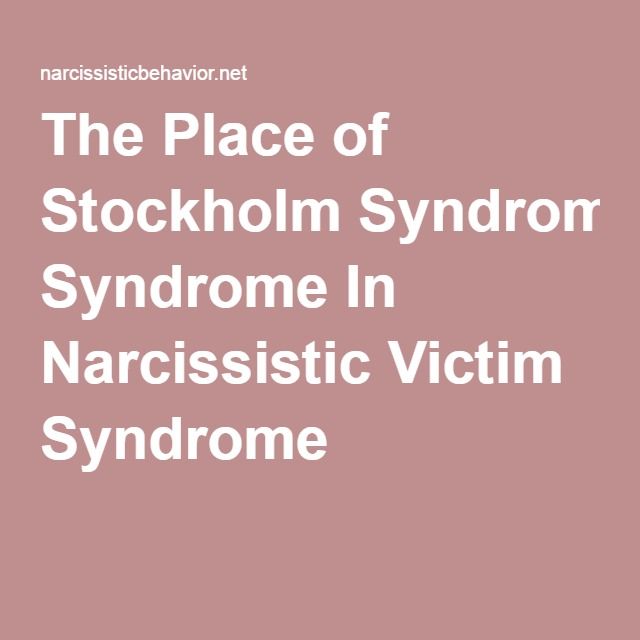 " These are the words of Sam Vaknin, professor of psychology, expert on narcissism and author of Book "Malignant Narcissism: Narcissism Revisited" , the first book on narcissistic abuse.1
" These are the words of Sam Vaknin, professor of psychology, expert on narcissism and author of Book "Malignant Narcissism: Narcissism Revisited" , the first book on narcissistic abuse.1
A narcissist can be your neighbor, boss or co-worker, difficult partner, parent or child. Perhaps you are dating a narcissist? Whoever this person is, those under the influence of a narcissist often live in loneliness, pain, and fear.
The exclusive CALDA clinic specializes in individual mental health rehabilitation programs, including the treatment of problems resulting from narcissistic abuse. This blog reveals some of the signs to look out for and provides guidance on what to do.
So how do you know if there is a narcissist in your life?
What is narcissistic behavior?
The first signs that your partner/boss/friend is a narcissist are often subtle. At first, they will shower you with praise, and in the case of a romantic relationship, with love.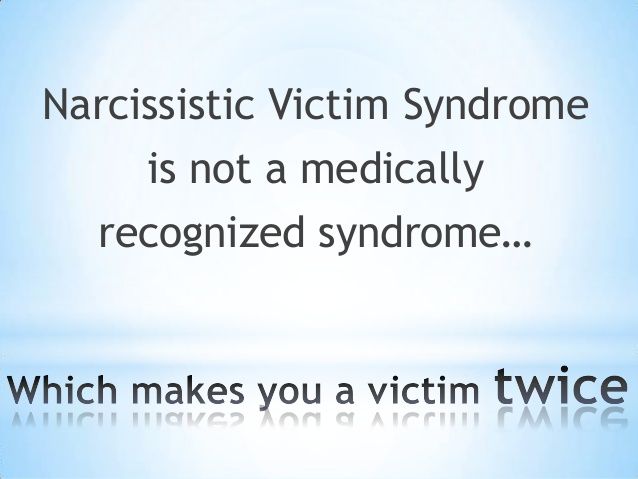 Relationships can seem almost perfect. When the first cues appear, the behavior may show itself as occasional outbursts of anger, or you may notice that the person is unable to take any kind of remarks or criticism. Or they may begin to negatively evaluate your appearance or behavior.
Relationships can seem almost perfect. When the first cues appear, the behavior may show itself as occasional outbursts of anger, or you may notice that the person is unable to take any kind of remarks or criticism. Or they may begin to negatively evaluate your appearance or behavior.
Narcissists tend to be domineering, dictating what to do, where to go, and even what to wear. This will gradually manifest itself as the relationship develops. The narcissist in your life will start to neglect you and your needs, and if you try to reason with them, they will put you down by saying things like "you're over-dramatizing" or "don't be funny." Your dreams, ideas, and needs are completely ignored by them because they lack the ability to care for and empathize with you.
For narcissists, there is only a sense of self-importance. They behave spoiled, expect constant praise and consider themselves superior to others. They can be proud and arrogant, expecting people to want to be around them. When a narcissist doesn't get what they want, they become irritable, rude, and angry. The narcissist easily feels offended and is often in a bad mood. He (or she) will never admit that the problem is in their own behavior - the fault always lies with someone else.
When a narcissist doesn't get what they want, they become irritable, rude, and angry. The narcissist easily feels offended and is often in a bad mood. He (or she) will never admit that the problem is in their own behavior - the fault always lies with someone else.
It is not a problem for a narcissist to destroy relationships openly and recklessly.
Why do people become narcissists?
Professor Vaknin describes the narcissist as "a collection of personalities in one body."2 The narcissist cannot be calculated because the behavior fluctuates between two limits. While the narcissist may appear unpredictable, incomprehensible, and complex, in reality, according to Vaknin, it is "a very simple binary machine" with "the behavior of a two-year-old child."
According to him, this is due to the fact that the parents do not provide the child with the opportunity to properly separate from the mother. The child was unable to perceive reality and "individuality". Narcissists become this way because they had an emotionally painful, neglectful, or even abusive childhood.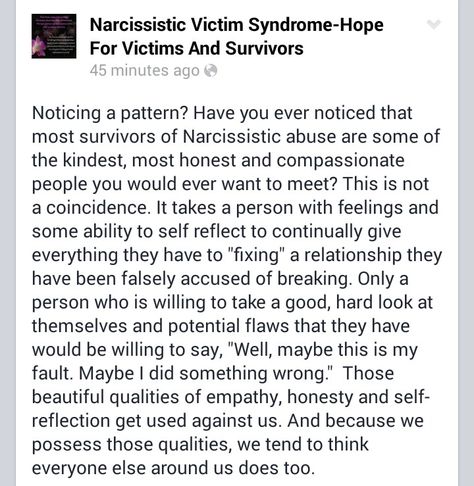
Narcissistic relationships are often based on superficial attributes such as beauty, power, and wealth. The narcissist wants to surround himself with people who fit the pompous image, so he is often attracted to people with strong wills. At first, the narcissist will idealize their partner, putting him on a pedestal - this is the place of shared fantasies. They are attracted to people who treat them well, as they like to present themselves in a favorable light. At first, the narcissist gives the impression of a likeable and charming person.
As the relationship progresses (when the honeymoon ends), the narcissist becomes disillusioned, unbalanced and aggressive. When the narcissist's behavior switches, he (or she) will seek to destroy the talents and qualities they initially admired. At this stage, the narcissist is in a state that Vaknin describes as "pathological narcissistic space". It is then that the narcissist will show his true colors. They may begin to insult, manipulate, use emotional blackmail and psychological pressure.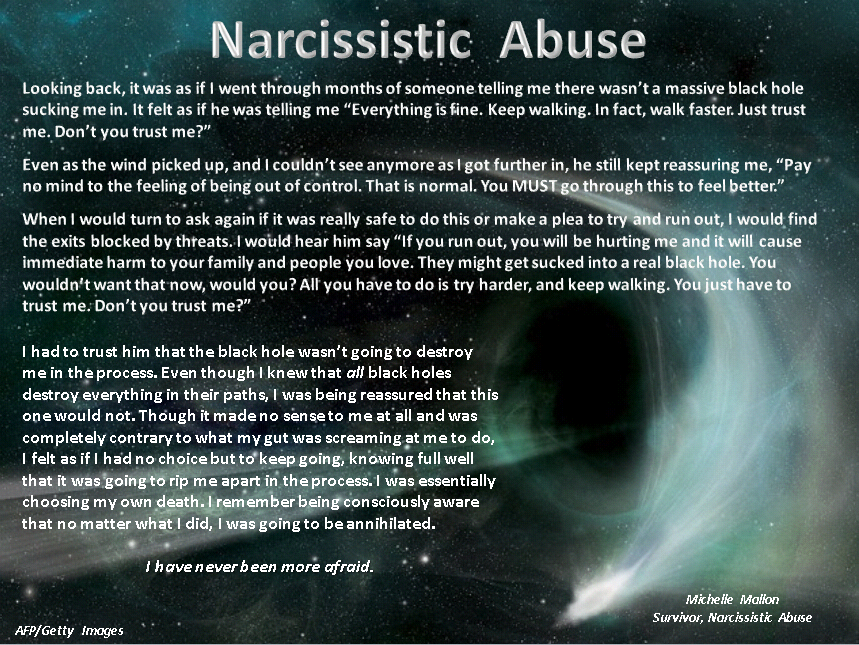 They may be denied money, sex, or communication; do anything to make their victim feel emotionally unstable.
They may be denied money, sex, or communication; do anything to make their victim feel emotionally unstable.
What is the impact of narcissistic violence?
Daffodils are difficult to recognize; they are prone to manipulation and exploitation, and many of them do not exhibit extreme narcissistic behavior. In other words, many of them are not textbook narcissists. But, as Vaknin reminds us, daffodils are everywhere. They, according to Vaknin, have reached the top in all areas of life, from politics to show business, law enforcement, the media, the judiciary and even the clergy. Everyone knows a narcissist.
The impact of this is enormous. There are many victims of narcissistic abuse today, including those in the upper echelons of society.
So what is the impact on those who are on the side of the victim?
Narcissistic abuse is mostly emotional but can also include physical and sexual abuse. As with any humiliating relationship, the abuser wears down the victim. Constant emotional trauma over a long period of time can lead to the development of post-traumatic stress disorder (PTSD). This persistent traumatic stress has been shown to have a real physiological effect on the brain, damaging the ability to think clearly and negatively impacting learning.3
Constant emotional trauma over a long period of time can lead to the development of post-traumatic stress disorder (PTSD). This persistent traumatic stress has been shown to have a real physiological effect on the brain, damaging the ability to think clearly and negatively impacting learning.3
The constant humiliation dosed by the narcissist leaves the victim with low self-confidence and self-esteem. Imagine how you would feel if you were constantly told that you are wrong.
In the short term, when the body builds up stress, it can cause physical symptoms such as body aches, headaches, and digestive problems.
Long-term symptoms may include cognitive, behavioral and emotional problems. For example, confusion, nightmares, poor thinking ability, poor attention span, poor problem solving ability, difficulty making decisions, poor memory, disorientation, feeling withdrawn, nervousness, inability to rest, associativeness, increased anxiety, feelings of fear, guilt or shame, feeling irritable, restless, depressed, angry, or overwhelmed.
What can you do?
First, it is important to understand that the consequences of narcissistic abuse are complex and can be profound. But don't despair, you can be reborn from narcissistic abuse with the right help.
Some victims of narcissistic abuse try to change the person, to help. But it's useless. The narcissistic personality type does not want to change and will constantly affect the world in accordance with their distorted vision. They consider themselves ideal and cannot understand why others do not see in them only brilliance, intelligence, magnificence and so on.
For those who are still in a relationship with a narcissist, it is not easy to end the relationship. Living in a narcissistic relationship is like walking on eggshells! But choosing the easiest path and continuing the abusive relationship will eventually take its toll. If you try to leave, they may beg you not to and shower you with gifts, but be aware that the narcissist will always return to their abusive habits.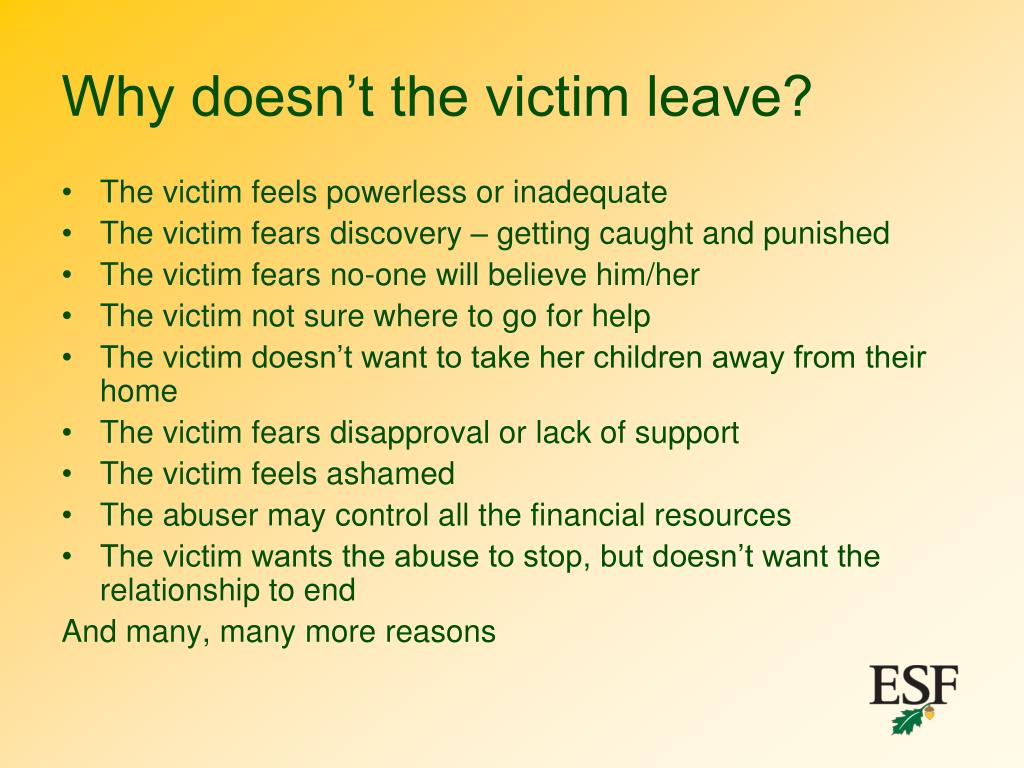
However, you can take back control. You need to trust friends or family to help you develop an exit plan. When you distance yourself from your abuser, it is best to cut off all contact, although this may not be possible completely if you have children together. In this case, you should limit the topics of conversation, and, most importantly, avoid casual conversations. This is very important if you want to heal from such a toxic relationship.
Healing from narcissistic abuse is extremely painful. Therapy can help you process and heal from trauma, teach you how to deal with challenges, and give you the opportunity to set boundaries for normal communication in the future.
It is important that you choose a therapy clinic/therapist who is experienced in treating this type of injury.
CALDA Clinic
CALDA Clinic is a privately owned Swiss institution specializing in mental health rehabilitation programs for VIPs, the super rich and celebrities. The unique CALDA concept guarantees personalized precision medicine and personalized premium support, including personalized counseling and state-of-the-art psychiatry delivered by a highly qualified team and network of experts.